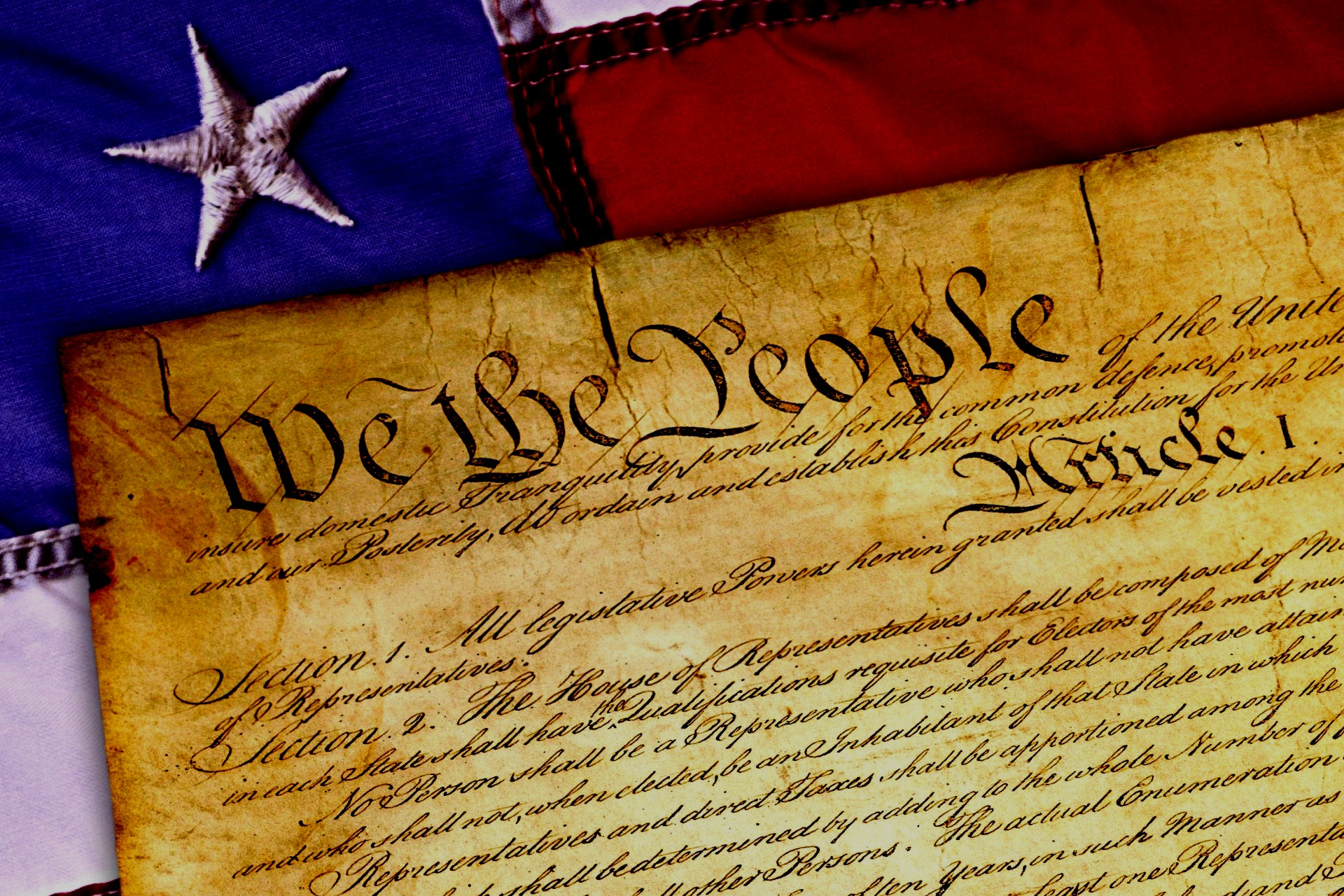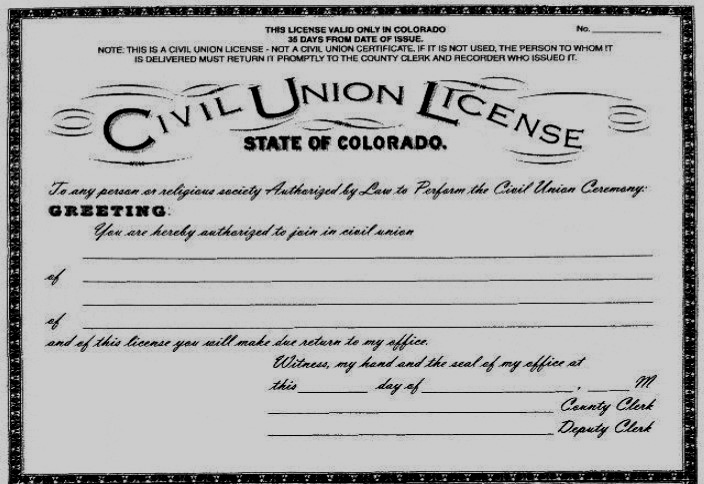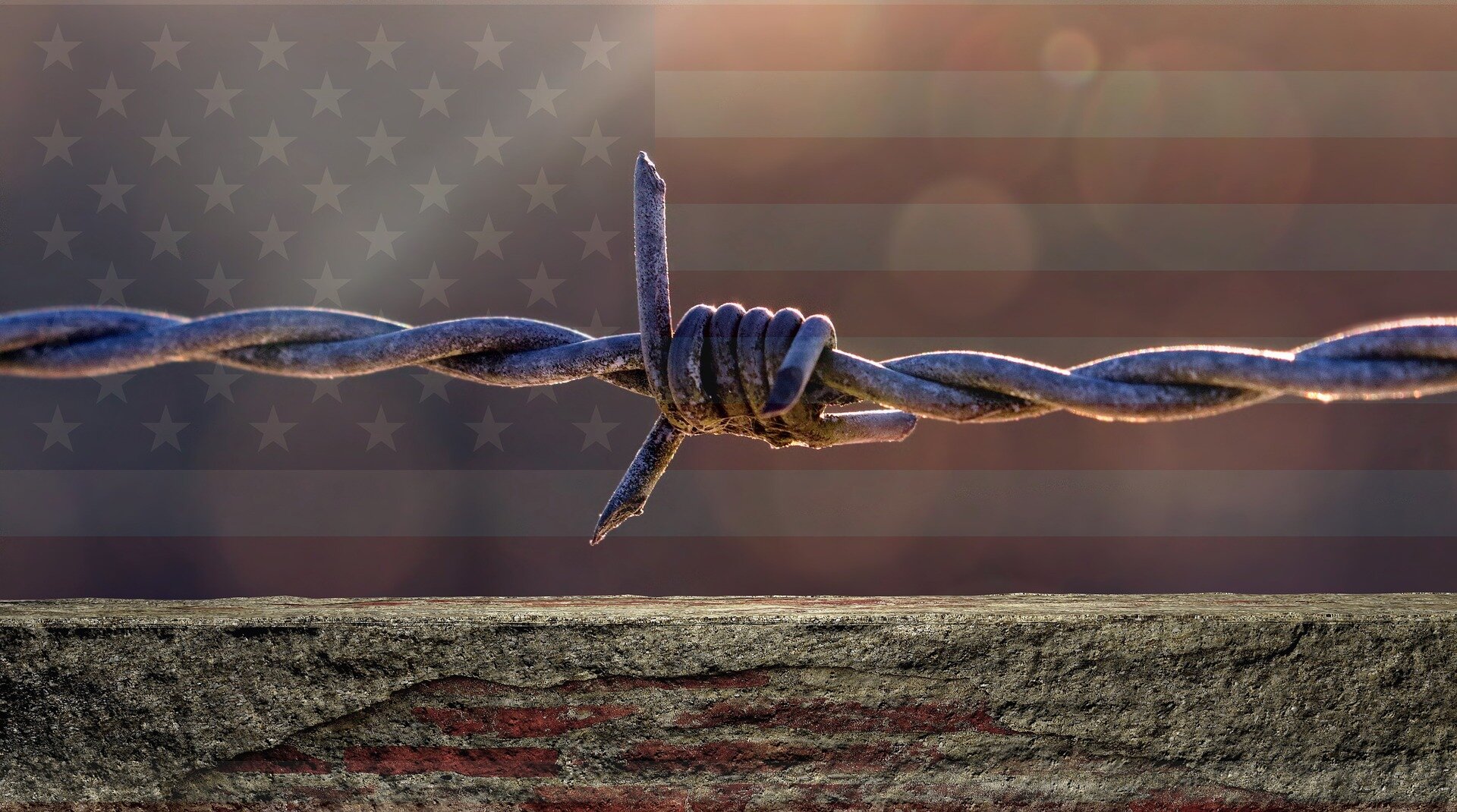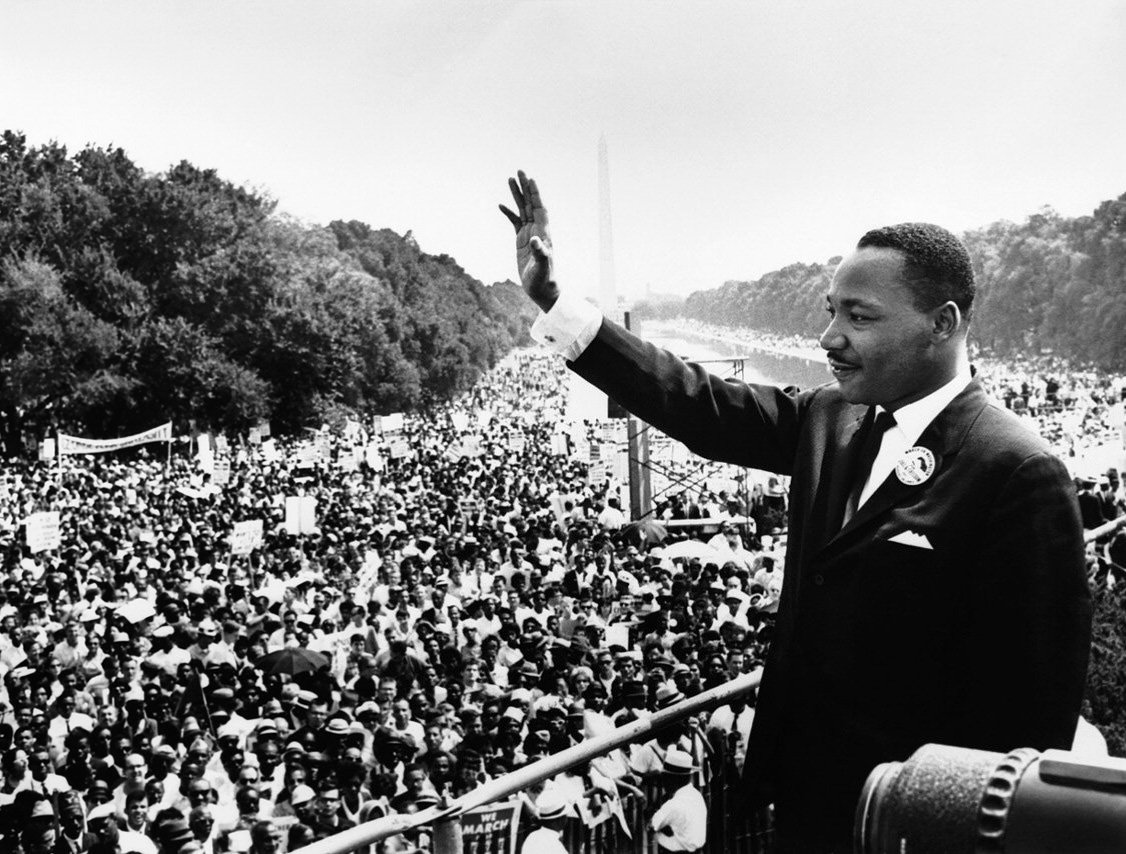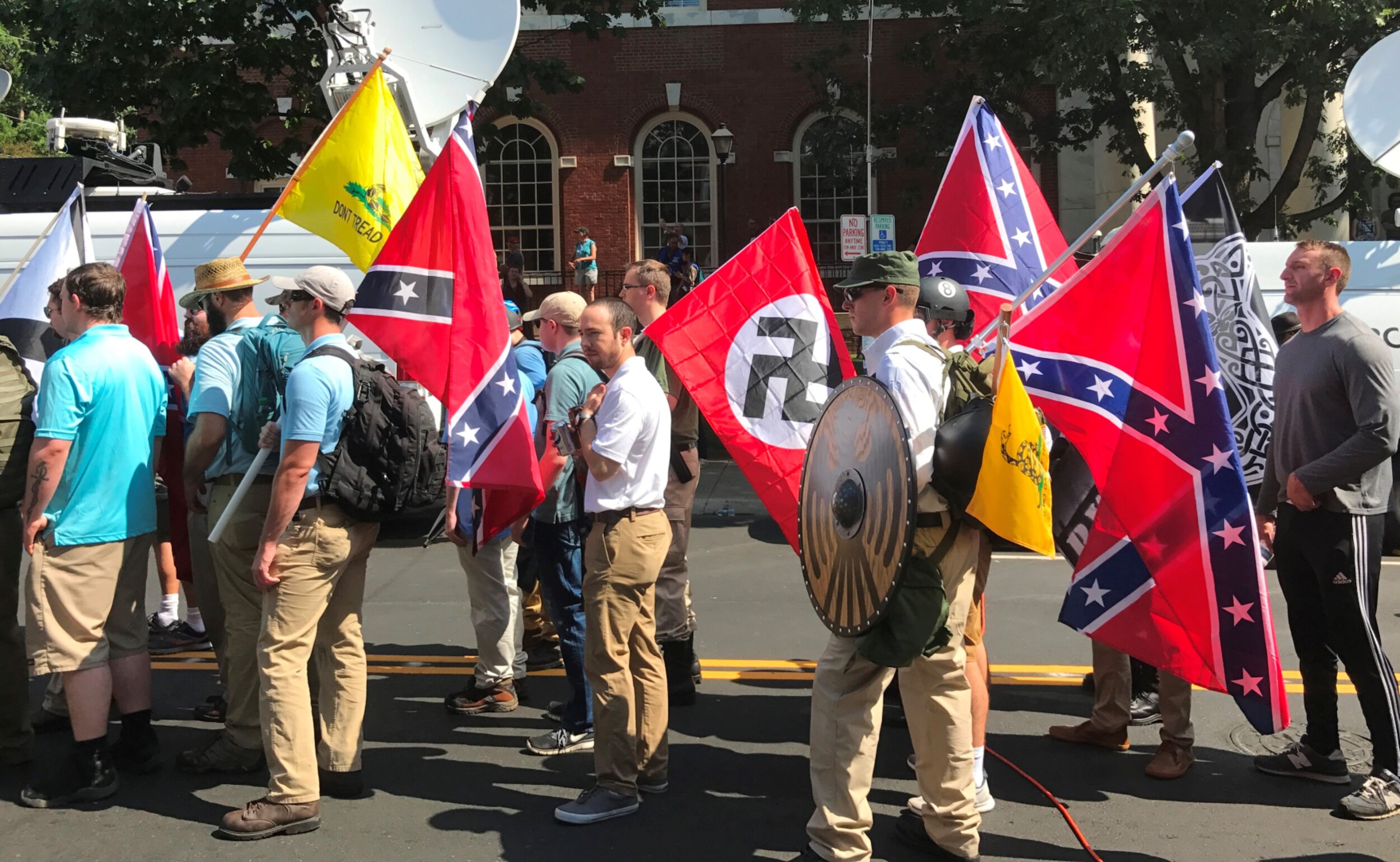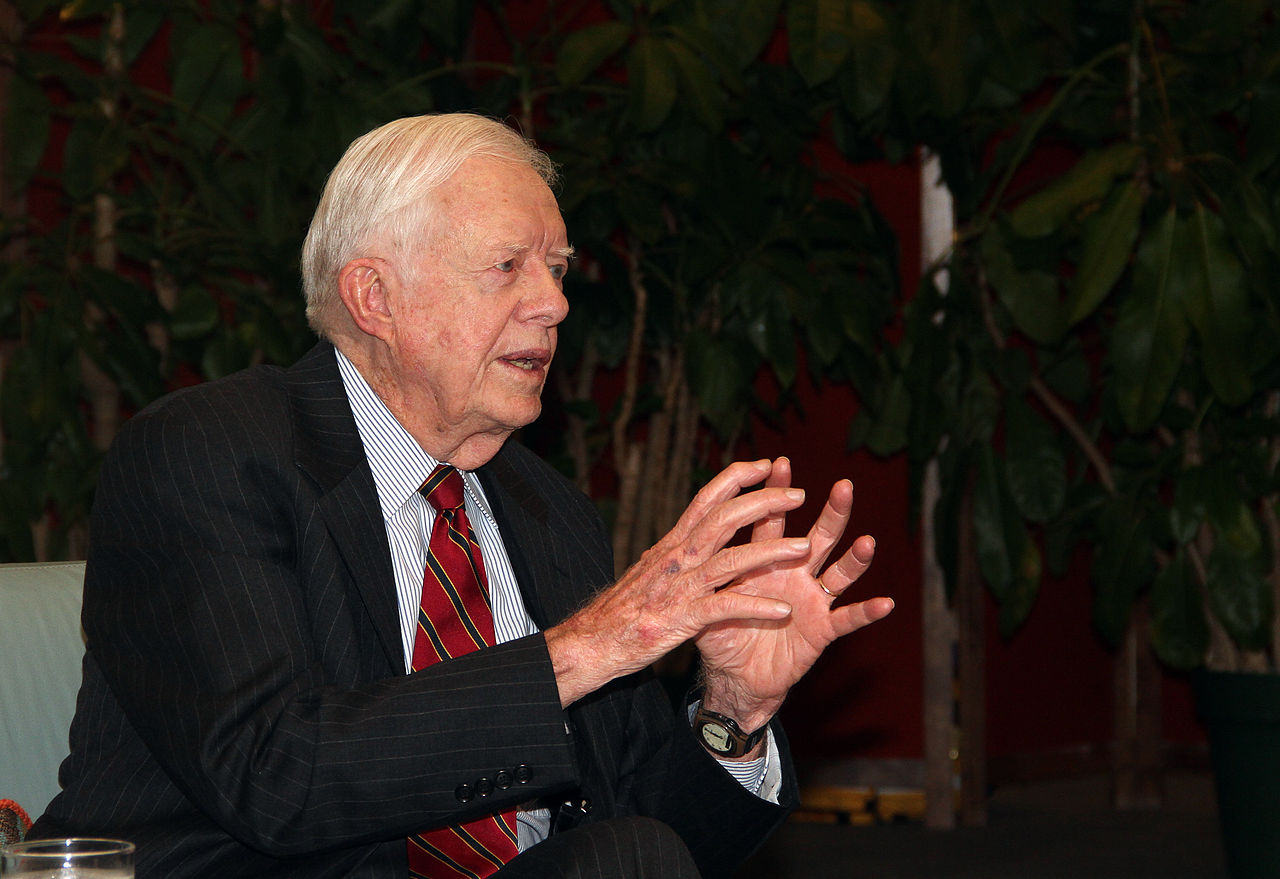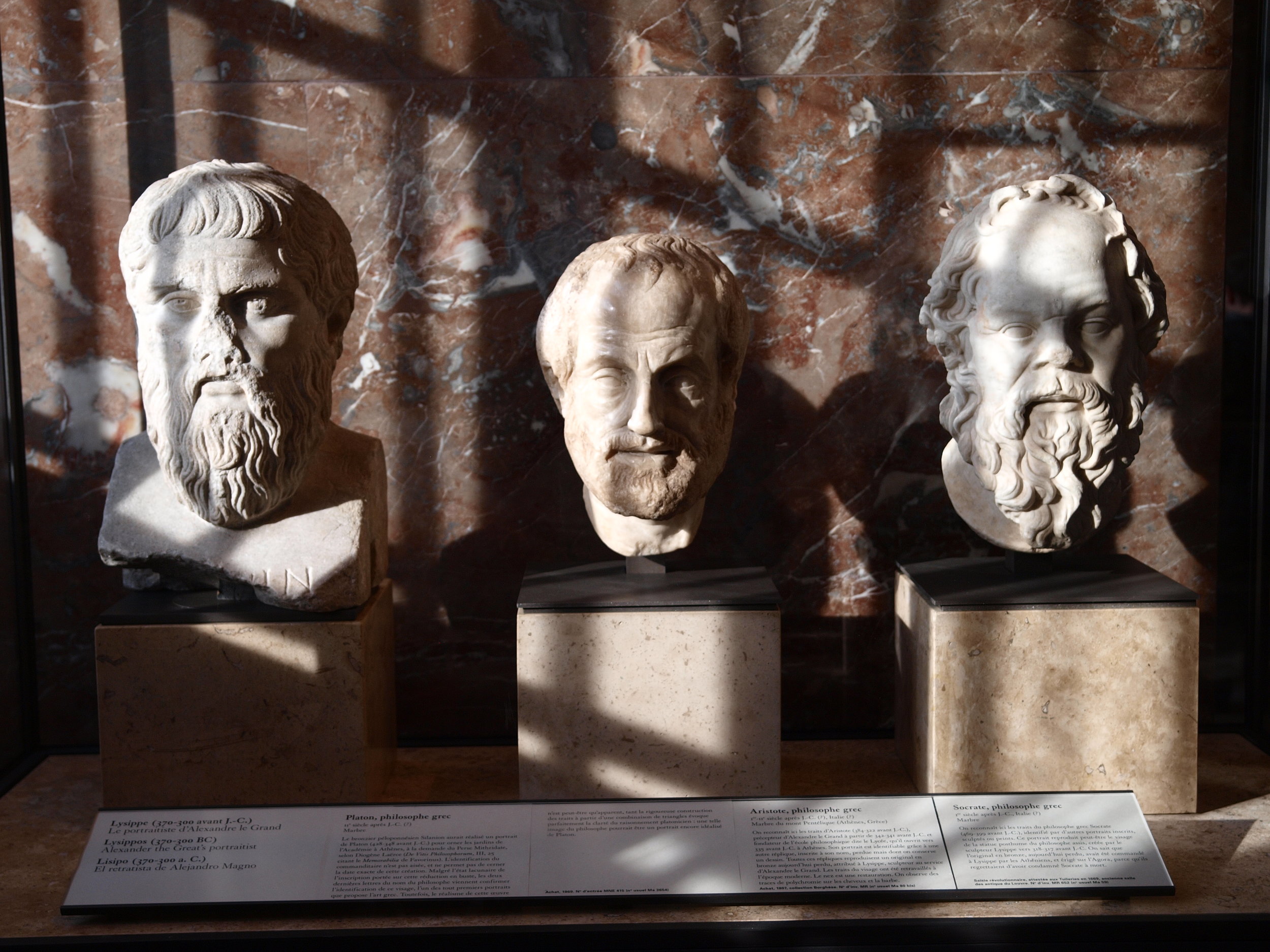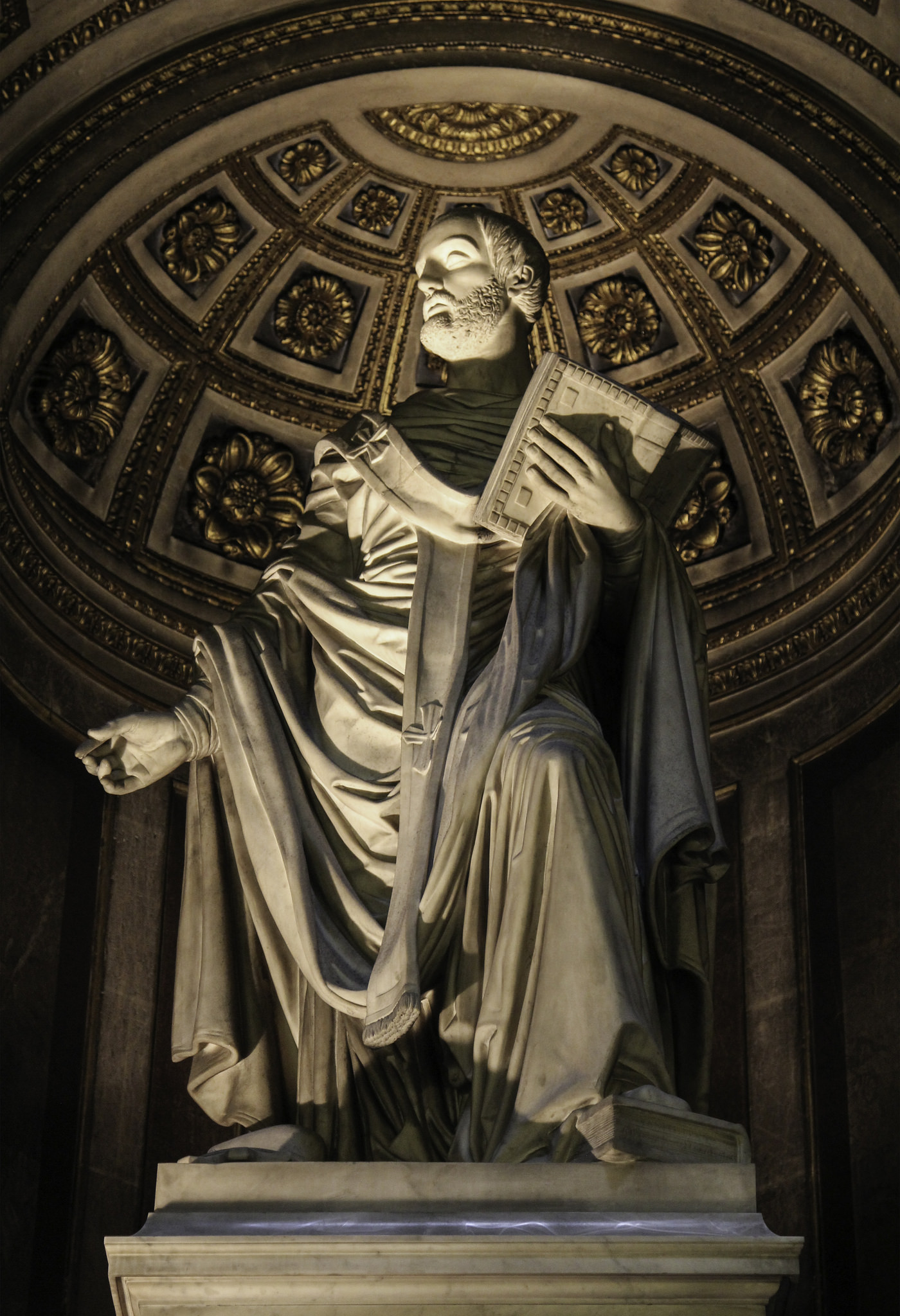The U.S. Constitution
Critiques of the U.S. Constitution & Supreme Court
Photograph: United States Constitution and flag. Photo credit: wynpnt | Public Domain, GoodFreePhotos.
Introduction
These resources explore the philosophical and moral flaws embedded in the U.S. Constitution. From a biblical and historical Christian perspective, the colonies opened up a legal gray zone, where certain behaviors considered grossly sinful were permitted, all revolving around the principle of putting property rights above human rights. This included kidnapping and enslaving people; seizing land; destroying family relations; exploiting labor; knowingly spreading disease; etc. The “economic conservatism” that adheres to the Constitution, therefore, has always been a residue of Christian heresy.
The U.S. Constitution and Supreme Court: Debates and Essays
Debate About Corruption on the Supreme Court
Mako’s debate on Facebook from a post on May 1, 2023 about Clarence Thomas’ failures to disclose and recuse himself. This post became a fascinating Rorschach test of whether people wanted to engage with a critique of Thomas as an individual Justice, or criticize the critic, or whether they wanted to engage with a critique of the Supreme Court as an institution, of which Clarence Thomas is the most alarming example of why we should be concerned.
The U.S. Constitution and Supreme Court: Appreciation and Critique
Origins, History, Ideological background
James Madison, Records of the Federal Convention, June 26, 1787, says, “An increase of population will of necessity increase the proportion of those who will labour under all the hardships of life, & secretly sigh for a more equal distribution of its blessings. These may in time outnumber those who are placed above the feelings of indigence. According to the equal laws of suffrage, the power will slide into the hands of the former. No agrarian attempts have yet been made in this Country, but symptoms of a leveling spirit, as we have understood, have sufficiently appeared in a certain quarters to give notice of the future danger. How is this danger to be guarded agst. on republican principles? How is the danger in all cases of interested co-alitions to oppress the minority [i.e. the wealthy] to be guarded agst.?” His answer: the Senate. (page 422 - 423).
H. Jefferson Powell, The Original Understanding of Original Intent. Harvard Law Review, Mar 1985.
Jaroslav Pelikan, The Bible and the Constitution. Yale University Press | Amazon page, 2004.
Mark A. Graber, Dred Scott and the Problem of Constitutional Evil. Cambridge University Press | Amazon page, Jul 2006.
Ben Heineman Jr., The Supreme Court: 'Originalism's' Theory and the Federalist Papers' Reality. The Atlantic, Jan 11, 2011. comments appreciatively of Bailyn: “One form—"original intent"— looks to the plain meaning of the constitutional words ("cruel and unusual" punishment") and, if that meaning does not decide a case 200 years later, that "originalist" formulation then tries to divine what the drafters and ratifiers of the Constitutional provisions intended. But there is no one historical method of determining the intent of multiple actors (with a variety of motives) in a highly political process. A brilliant exposition of the political fights about the constitution's origins—and the difficulty of ascertaining precise intent on specific provisions— is Bernard Bailyn's essay, "The Federalist Papers,”” in Bernard Bailyn, To Begin the World Anew: The Genius and Ambiguities of the American Founders. Vintage | Amazon page, February 10, 2004. Sean Illing, Why Scalia's "Strict Constructionist” Label is About Politics, not the Constitution. Vox, Mar 21, 2017. cites evidence that the founders disagreed immediately about the meaning of the Constitution, which challenges the originalist position because there was not an originally understood, common interpretation. See also Ken Levy, The Problems With Originalism. New York Times, Mar 23, 2017. phrases were made deliberately ambiguous and flexible. See also R.L.G., Antonin Scalia and Language: Originalism's Sin. The Economist, Oct 17, 2013. Adrian Vermule, Beyond Originalism. The Atlantic, Mar 31, 2020. “The dominant conservative philosophy for interpreting the Constitution has served its purpose, and scholars ought to develop a more moral framework.” Harvard professor Vermule advocates common-good constitutionalism, influenced by Ronald Dworkin. See also Donald F. Kettl, Thomas Jefferson Has a Clear Message for the Supreme Court About the Constitution and ‘Originalism’. MarketWatch, Oct 31, 2020.
Eric Posner, The U.S. Constitution is Impossible to Amend. Slate, May 5, 2014.
Gordon Wood and Steven Pincus, The Political Path to Revolution and War, 1760-1776. American Revolution Institute, Jan 7, 2016. is a 2 hour discussion; explores British fiscal policy and national debt. The British options: taxation (especially of the colonies); growth; ignore it. The North American colonies were also growing in population faster than anywhere else; trade including slavery was more important as well. At 1:46:00, the scholars address how in England, the English Bill of Rights was written to limit the King, but not Parliament; the English Parliament had no legal checks on its power. Whereas in the U.S., the U.S. Bill of Rights was written to limit Congress, and the entire government.
Jesse Merriam, Clarence Thomas’s Conservative Identity Politics. The American Conservative, Aug 22, 2017. Liberals aren't the only ones using the court to advance preferred policies
Ryan Grim, Amy Coney Barrett’s Take on Voting Rights Act Exposes Her Entire Legal Philosophy As a Lie. The Intercept, Oct 14, 2020. “Barrett claims to defer to the original meaning of statutes, but when it comes to the Voting Rights Act, that deference is out the window.”
Mark Joseph Stern, Neil Gorsuch Supports an Originalist Theory That Would Destroy Modern Governance. Slate, Mar 19, 2021. Just one problem: It’s bunk. “Nondelegation is a judicially created doctrine that has had exactly one year of actual existence, 1935, over the 2½ centuries of the American republic. It says, in essence, that only Congress can make rules that govern private conduct, and all administrative agencies can do is apply the rules and maybe fill in some small details about the rules in the course of doing their work.”
Delegates of the Democracy Constitution, A New Constitution for The United States. Democracy Journal, Summer 2021.
Amanpour and Company, Noah Feldman: Is the Constitution the Perfect Moral Document You Think It Is? Amanpour and Company, Nov 5, 2021. Lincoln, in his First Inaugural Address, believed that the Southern States needed to be voluntarily won back to union, and believed that slavery was endemic to the Constitution. Not surprisingly, the First Inaugural Address has been understudied. The Constitution was not a great moral document. Feldman said that the 1787 Constitution did have slavery and racism baked in; free states had to collude with the Fugitive Slave Laws. The 13th, 14th, and 15th Amendments signaled a new Constitution and a new nation.
Matt Ford, The Supreme Court Is Poised to Sabotage the Administrative State. The New Republic, Nov 30, 2021. re: the Chevron deference principle which allows the Executive branch to function
Ryan Grim and Emily Jashinsky, Supreme Courts Guts the EPA: Is the Federal Reserve Next? Rising | The Hill, Jul 1, 2022. Emily Jashinsky, a conservative political journalist, admits that the “originalists” of today arbitrarily choose Madison over Hamilton with regards to the size and scope of the federal government.
Erwin Chemerinsky, Even the Founders Didn’t Believe in Originalism. The Atlantic, Sep 6, 2022. “To follow the Framers’ ideas about the Constitution means abandoning their understanding of it.”
Erwin Chemerinsky, Worse Than Nothing: The Dangerous Fallacy of Originalism. Yale University Press | Amazon page, Sep 6, 2022. See interview by Sam Seder and Emma Vigeland, The Fraud Of Judicial Originalism | Erwin Chemerinsky. The Majority Report, Aug 23, 2023.
Ian Ward, Critics Call it Theocracy and Authoritarian. Young Conservatives Call It an Exciting New Legal Theory. Politico, Dec 9, 2022. On common good constitutionalism, an expression of catholic integralism.
Emma Brown and Rosalind S. Helderman, For John Eastman and Clarence Thomas, an Intellectual Kinship Stretching Back Decades. Washington Post, Dec 23, 2022. “The Supreme Court justice and the lawyer referred by the House Jan. 6 panel for criminal investigation became acquainted years before Eastman served as Thomas’s clerk.” The Claremont Institute argues that the founders believed in “natural law” and embedded it into the Constitution.
Emma Vigeland, The Side Of Jefferson vs Hamilton Historians Won't Tell You. The Majority Report w/ Sam Seder, Jan 15, 2023.
Vox, Why Texas Judges Have So Much Power Right Now. Vox, May 11, 2023. A helpful overview of the structure of the judicial branch of the federal government.
The Locke Society Staff, Destroying the U.S. One Lesson at a Time – Part 8: Rewriting the U.S. Constitution. The John Locke Society.
Personhood: Human versus Corporate
In the Three-Fifths Compromise (Article 1, Section 2, Clause 3), “persons” referred to free human beings, who happened to be white. It did not refer to “corporations.” See Ryan Grim, McConnell Embarrasses Himself Defending Corporations, Proves Establishment's Smug Cluelessness. Rising | The Hill, Jul 7, 2021. At the 4:30 min mark for discussion of the Supreme Court justice who decided that corporations are “people.”
Thom Hartmann, Lincoln Didn't Fight the Civil War to Free the Corporations. TEDxConcordiaUPortland, May 9, 2014. The Boston Tea Party was a response to a monopolistic corporation dumping tea at low prices to wipe out colonial entrepreneurs. The Progressive Era was a response to the Gilded Age, bringing about not only economic but political reforms like expanding the vote. Hartmann points out the Old Wisconsin Law banning corporations from interfering with campaigns and legislation. Judges alone -- not citizens, lawmakers, etc. -- declared that money is speech under the First Amendment and corporations are persons under the Fourteenth Amendment. Hartmann advocates the Twenty-Eighth Amendment restricting this.
David Dayen, Episode 3: The Powell Memo | Master Plan. The Lever, Nov 5, 2024. A 50 minute video on pro-tobacco corporate lawyer Louis Powell and the Powell Memo and the birth of the modern conservative movement and takeover of the Republican Party. See also Michael Burns, Democracy Is Collapsing: This 1971 Playbook Started It All. Wisecrack, Mar 7, 2025. A 16 minute video on the Powell Memo, its influence, and Powell’s appointment to the Supreme Court under Nixon.
First Amendment: Freedom of Religious Conscience
Lemon v. Kurtzman (1971) is the current benchmark for public vs. private religious schools, and establishment or disestablishment.
Yoder v. Wisconsin (1972). Jonas Yoder and Wallace Miller, both members of the Old Order Amish religion, and Adin Yutzy, a member of the Conservative Amish Mennonite Church, were prosecuted under a Wisconsin law that required all children to attend public schools until age 16. The three parents refused to send their children to such schools after the eighth grade, arguing that high school attendance was contrary to their religious beliefs. Did Wisconsin's requirement that all parents send their children to school at least until age 16 violate the First Amendment by criminalizing the conduct of parents who refused to send their children to school for religious reasons? SCOTUS ruled that the Amish families’ right to practice their religious beliefs took priority. The home schooling movement took off after this ruling.
Winnifred Fallers Sullivan, Prison Religion: Faith-Based Reform and the Constitution. Princeton University Press | Amazon page, 2009.
John M. Barry, God, Government and Roger Williams’ Big Idea. Smithsonian, Jan 2012. re: the separation of church and state
John Paul Stevens, Six Amendments: How and Why We Should Change the Constitution. Little, Brown and Company | Amazon page, 2014.
Robert McNamara and Paul Sherman, The Abortion Case That’s Really About the First Amendment. New York Times, Mar 20, 2018.
Katherine Stewart, Whose Religious Liberty Is It Anyway? New York Times, Sep 8, 2018.
Ryan Lucas, Everyone Deep In The Desert, A Case Pits Immigration Crackdown Against Religious Freedom. NPR, Oct 18, 2018. what if a person helps people crossing the border, undocumented, because of faith?
Brian Tyler Cohen, Amy Coney Barrett Humiliates Herself, Forgets First Amendment When Asked. Brian Tyler Cohen, Oct 14, 2020. On the First Amendment right to protest, and the 10 states whose Republican-led legislatures have restricted the right to protest.
Kevin Blaine, Is Religious Freedom a Liberal or Conservative Value? Washington Post, Nov 29, 2020.
Mark Joseph Stern, The Supreme Court Rejects Opportunity to Roll Back Marriage Equality. Slate, Dec 14, 2020. “Indiana asked the justices to strip rights from same-sex parents. They passed.” re: Box v. Henderson. “the Supreme Court turned away Indiana’s attempt to strip equal parenting rights from married same-sex couples. The court’s decision ensures that same-sex couples in Indiana will remain the lawful parents of their own children, ending the state’s six-year-long crusade to remove their names from their children’s birth certificates. But beyond Indiana, Monday’s order also suggests that a majority of the justices aren’t eager to roll back marriage equality.”
Pete Williams, Supreme Court Hears Arguments On Boston's Refusal To Fly Christian Flag Above City Hall. MSNBC, Jan 18, 2022.
Ian Millhiser, The Supreme Court Is Leading a Christian Conservative Revolution. Vox, Jan 30, 2022.
ACLU Urges House of Representatives to Oppose Anti-semitism Awareness Act. ACLU, Apr 26, 2024.
James Talarico, Public Schools Are Not Sunday Schools. James Talarico, Nov 25, 2024. Talarico argues as a seminary student, minister-in-training, and Congressman that the Texas GOP leaders recognize they are proposing something unconstitutional, because they want teachers in public schools who teach the Bible to have immunity from First Amendment lawsuits.
Bradley Onishi and Dan Miller, Christian Fascism at the State of the Union | SWAJ Weekly Roundup. Straight White American Jesus Podcast, Mar 7, 2025. An exposition of Representative Al Green (D-TX) standing and waving his cane at President Trump for claiming to have a mandate. Meanwhile, Vice President J.D. Vance, who calls himself a Catholic albeit in the stream of reactionary Catholics like billionaire Peter Thiel, and Speaker of the House Mike Johnson, a Southern Baptist who wanted to overturn the 2020 election at the January 6, 2021 insurrection. Brad and Dan explore the history of what these political leaders have said, the policies they have supported, and the networks to which they are connected. Meanwhile, Al Green is a Black Baptist from the NAACP standing up for the vulnerable and the programs of Social Security, Medicare, and Medicaid. Rep. Dan Newhouse (R-WA) moved to censure Green on the grounds of violating “decorum.” Ten Democrats voted with the Republicans to censure Green. Recall that Rep. Marjorie Taylor Green (R-GA) loudly interrupted President Biden but was not censured — and she is White. At the 46:50 minute mark, Brad and Dan explore the legal and political implications of the U.S. Attorney Ed Martin in DC threatening Georgetown University Law School for DEI. The Law School Dean William Treanor wrote back grounded in the First Amendment. Trump and Vance are picking and choosing among the Catholics and Protestants they prefer. Even Tulsi Gabbard claims to support Assad in Syria because he protected Christians. By contrast, Ukraine has a lot of Christians, but we are not interested in protecting them from a dictator.
First Amendment: Freedom of Speech
Schenck v. United States (1919) established the “clear and present danger” limitation on free speech, like yelling “fire” in a crowded theater and causing a dangerous situation. This principle was later superseded by the Brandenburg limitation in Brandenburg v. Ohio (1969). Brandenburg, a leader in the Ku Klux Klan, made a speech at a Klan rally and was later convicted under an Ohio criminal syndicalism law. The law made illegal advocating "crime, sabotage, violence, or unlawful methods of terrorism as a means of accomplishing industrial or political reform," as well as assembling "with any society, group, or assemblage of persons formed to teach or advocate the doctrines of criminal syndicalism." The Court's Per Curiam opinion held that the Ohio law violated Brandenburg's right to free speech. The Court used a two-pronged test to evaluate speech acts: (1) speech can be prohibited if it is "directed at inciting or producing imminent lawless action" and (2) it is "likely to incite or produce such action." The criminal syndicalism act made illegal the advocacy and teaching of doctrines while ignoring whether or not that advocacy and teaching would actually incite imminent lawless action. The failure to make this distinction rendered the law overly broad and in violation of the Constitution.
West Coast Hotel Co. v. Parrish (1937) overturned the Lochner era, insisting that freedom to contract for the good of labor is constitutional. “Deprivation of liberty to contract is forbidden by the Constitution if without due process of law, but restraint or regulation of this liberty, if reasonable in relation to its subject and if adopted for the protection of the community against evils menacing the health, safety, morals and welfare of the people, is due process.”
New York Times Company v. United States (1971). A freedom of the press vs. prior restraint case. The Court held that the government did not overcome the "heavy presumption against" prior restraint of the press in this case. Justices Black and Douglas argued that the vague word "security" should not be used "to abrogate the fundamental law embodied in the First Amendment." Justice Brennan reasoned that since publication would not cause an inevitable, direct, and immediate event imperiling the safety of American forces, prior restraint was unjustified.
John Paul Stevens, Six Amendments: How and Why We Should Change the Constitution. Little, Brown and Company | Amazon page, 2014.
Garrett Epps, The Bogus 'Free Speech' Argument Against Unions. The Atlantic, Feb 14, 2018.
Robert McNamara and Paul Sherman, The Abortion Case That’s Really About the First Amendment. New York Times, Mar 20, 2018.
Amy Goodman and Juan Gonzalez, Meet the Texas Speech Pathologist Who Lost School Job for Refusing to Sign Pro-Israel, Anti-BDS Oath. Democracy Now! Dec 18, 2018. Bahia Amawi, a Palestinian-American contract employee with a public school district in Austin, TX, refused to sign a contract to not boycott Israel, and was fired.
Marc Ambinder, Did Schiff Poke a Hole in the First Amendment? New York Times, Dec 16, 2019. “in revealing whom Mr. Solomon talked with, and when, Mr. Schiff and his committee have created a new pathway for the government to find and reveal a reporter’s sources and to question his or her motives. That is wrong. The legislative branch should not use its subpoena power to police journalism.”
MSNBC, Sen. Whitehouse Gives Presentation On 'Dark Money' Influence On Supreme Court Nomination. MSNBC, Oct 13, 2020. The result of viewing corporations as people, and campaign contributions as free speech. Chuck Todd, Whitehouse: Supreme Court Transparency Would Reveal 'Rot'. Meet the Press Daily | MSNBC, Oct 14, 2020. Krystal Ball and Saagar Enjeti, Dem Senator Exposes Big Money Behind SCOTUS Nominees. Rising | The Hill, Oct 14, 2020. .
Brian Tyler Cohen, Amy Coney Barrett Humiliates Herself, Forgets First Amendment When Asked. Brian Tyler Cohen, Oct 14, 2020. On the First Amendment right to protest, and the 10 states whose Republican-led legislatures have restricted the right to protest.
Robert Barnes, Supreme Court Sides with Black Lives Matter Activist in First Amendment Case. Washington Post, Nov 2, 2020.
Kmele Foster, David French, Jason Stanley and Thomas Chatterton Williams, We Disagree on a Lot of Things. Except the Danger of Anti-Critical Race Theory Laws. New York Times, Jul 5, 2021. “The authors are a cross-partisan group of thinkers who have written extensively about authoritarianism, liberalism and free speech.”
ACLU Urges House of Representatives to Oppose Anti-semitism Awareness Act. ACLU, Apr 26, 2024.
Brian Tyler Cohen, “Airtight Case!” Trump Hit With Devastating New Lawsuit. Brian Tyler Cohen, Feb 22, 2025. The Associated Press has sued Trump for banning access to the White House because they refuse to call the Gulf of Mexico “Gulf of America.”
PBS News Hour, Trump Administration Targets Foreign Students Who Protested Against Israel's War in Gaza. PBS News Hour, Mar 10, 2025. A former student at Columbia University in New York was arrested by immigration authorities despite having a green card. Mahmoud Khalil, who helped organize on-campus protests against Israel’s war on Gaza, was seized, according to President Trump, for espousing pro-Hamas views. William Brangham discussed more with Abed Ayoub of the American-Arab Anti-Discrimination Committee. See also Ryan Grim, Emily Jashinsky, and Krystal Ball, "Get Them Out" Trump Pledges Mass Purge of Student Activists. Breaking Points, Mar 12, 2025. See Natasha Lennard, If Trump Can Deport Mahmoud Khalil, Freedom of Speech Is Dead. The Intercept, Mar 10, 2025. “It’s illegal to deport people for political speech, but that’s exactly what ICE is trying to do to this Palestinian Columbia student.”
Andras Petho, Trump’s Attempts to Muzzle the Press Look Familiar. The Atlantic, Mar 15, 2025. Much of what the U.S. president has done to curb independent media echoes the Hungarian autocrat Viktor Orbán’s playbook. Petho is a co-founder and editor of Direkt36, an investigative-journalism center in Hungary. He was a Nieman Fellow at Harvard University from 2019 to 2020.
Jeremy Scahill, Exclusive: Mahmoud Khalil's Attorney on Breaking Developments in Detained Columbia Graduate's Case. Drop Site News, Mar 19, 2025. Important insights as to how the First Amendment has been understood.
Meghnad Bose, “First, They Came for Mahmoud Khalil”. Drop Site News, Mar 23, 2025. Those close to him tell the story of a man whose journey took him from being a "double refugee" to scholar to political prisoner.
Kyle Kulinski, Libertarians Turn On Trump In Spectacular Fashion. The Kyle Kulinski Show, Apr 2, 2025. Representatives of Mises and FEE take to video to criticize Trump’s foreign policy menacing Iran and expansionary wars, and former Senator Ron Paul speaks out on violations of free speech, including on college campus for pro-Palestine protests.
Lilia Luciano and Joe Walsh, Detained Columbia Student Mohsen Mahdawi Tells CBS News He Feared Citizenship Interview Was “Honey Trap”. CBS News, Apr 15, 2025. “Mahdawi — who says he was set to receive his bachelor's degree in philosophy in May — co-founded Columbia's Palestinian Student Union in 2023 along with Khalil. Mahdawi was later active in protests on Columbia's campus against Israel's war in Gaza, which began after Hamas' terrorist attack launched from the Gaza Strip on Oct. 7, 2023. His attorneys said in a court filing that Mahdawi "took a step back" from organizing the protests in March 2024, before the protests escalated later that spring, with demonstrators forming encampments and occupying a campus building.”
Second Amendment
Alexander Hamilton, Federalist Papers #29 (1787 - 1789) says that the Constitution assumes that non-governmental citizens can possess the same level of armaments as the government, which would imply that we could own predator drones and suitcase nukes today. Hamilton also refers quite clearly to States regulating the militia with regards to leadership and supplies, not the individual interpretation of DC v. Heller.
“Militia” is a term also used in the Fifth Amendment. “No person shall be held to answer for a capital, or otherwise infamous crime, unless on a presentment or indictment of a grand jury, except in cases arising in the land or naval forces, or in the militia, when in actual service in time of war or public danger…” That does not sound like an individual, but rather a “well regulated” force organized by an individual State.
McDonald v. Chicago (2010). SCOTUS used the 14th Amendment to apply the 2nd Amendment to Illinois and Chicago.
John Paul Stevens, Six Amendments: How and Why We Should Change the Constitution. Little, Brown and Company | Amazon page, 2014. Justice Stevens reconsiders the Second Amendment.
Carol Anderson, The Second: Race and Guns in a Fatally Unequal America. Bloomsbury Publishing | Amazon page, Jun 2021. An outstanding history of how slave patrols and white desire to control of black people consistently motivated laws and policies relating to arms. See interview by Amy Goodman, “The Second”: Carol Anderson on the Racist Roots of the Constitutional Right to Bear Arms. Democracy Now, Jun 3, 2021.
Angele Latham, Could Tennessee Drag Restrictions Apply in Private Homes? How State Argued Before a Federal Appeals Court. The Tennessean, Feb 26, 2024.
Fifth Amendment
Institute for Justice, History of Eminent Domain and Its Abuses. Institute for Justice. Highlights the differences between “public use” and “public purpose” and “private use with increased tax revenues expected.” Note link to Dana Berliner, Opening the Floodgates: Eminent Domain Abuse in the Post-Kelo World. Castle Coalition, June 2006.
Terry Calvani, Eminent Domain and the Environment. Cornell Law Review, Apr 1971.
Fred Bosselman, David Callies, John Banta, The Taking Issue: An Analysis of the Constitutional Limits of Land Use Control. U.S. Government Printing Office, 1973.
Harvey M. Jacobs, Who Owns America: Social Conflict Over Property Rights. University of Wisconsin Press | Amazon page, 1998.
Alexandra Klass, Eminent Domain Law as Climate Policy. University of Minnesota Law School, 2020.
Alex Berry, Germany: Berlin Locals Vote to Expropriate Housing Giants. Deutsche Welle, Sep 26, 2021. See also Leander Jones, After Berliners Voted to Nationalize Housing, City Hall Isn’t Delivering. Jacobin, May 2, 2022.
Department of Justice Environment and Natural Resources Division, History of Federal Use of Eminent Domain, updated Jan 2022.
Katherine Yon Ebright, The Alien Enemies Act, Explained. Brennan Center for Justice, Oct 9, 2024. This detention and deportation power poses an alarming risk of abuse and rights violations in both wartime and peacetime. The Fifth Amendment protects U.S. citizens and immigrants against discrimination and rights violations perpetrated by the federal government. The courts typically strike down policies that discriminate based on a suspect classification, such as race or ancestry, and policies that infringe on fundamental rights.
Sylvia Foster-Frau, For Four Venezuelan friends, Alien Enemies Act Cuts Short an American Dream. Washington Post, Mar 18, 2025. “The men had just begun new lives in Dallas when officers arrived at their home and arrested them. Their relatives deny that the four have any connection to the Tren de Aragua gang.”
Devin J. Stone, Trump Defies Court Order; Illegally Deports and Imprisons Venezuelans. Legal Eagle, Mar 20, 2025.
Saagar Enjeti and Ryan Grim, Glenn Greenwald Schools Saagar on Deportation. Breaking Points, Mar 24, 2025. Glennwald emphasizes due process. Tom Homan cannot answer logical and legal questions. Not only that, deportation means returning someone to their country of origin, and Trump’s deportation of Venezuelans to El Salvador is absolutely lawless and cruel. “People who trade liberty for security will get neither.” Glennwald defends civil liberties for all persons, not just civilians.
Heather Cox Richardson, March 22, 2025. Letters from an American | Substack, Mar 23, 2025. Perhaps out of concerns of constitutional illegality. “Perhaps in response to the growing outcry over last weekend’s rendition of Venezuelan migrants to El Salvador under a legal justification a federal judge has found questionable, President Donald Trump last night told reporters that he didn’t sign the proclamation that set that legal process in motion. When asked when he signed the proclamation invoking the 1798 Alien Enemies Act, by which Trump claimed that Venezuela is invading the United States by sending alleged gang members over the border, Trump answered: “I don’t know when it was signed, because I didn’t sign it.” Trump was on his way to his golf club in New Jersey, and seemed to be handing off responsibility for the declaration to someone else, perhaps Secretary of State Marco Rubio. “Other people handled it,” he said. “But Marco Rubio’s done a great job. And he wanted them out, and we go along with that. We want to get criminals out of our country.””
Jacob Knutsen, Supreme Court Allows Trump to Deport People Under Wartime Law. Democracy Docket, Apr 7, 2025. Due process still required. See also Sam Stein, SCOTUS Delivers Gut Punch to Trump’s Due Process Fantasy. Bulwark Takes, Apr 7, 2025.
Sixth Amendment
Stephen Carter, 21,000 Reasons Scalia Was Right. Bloomberg, Apr 21, 2017. about the Sixth Amendment, and the MA case of forged and tampered drug testing.
Gideon v. Wainwright (1963). SCOTUS applied the 14th Amendment to apply the 6th Amendment to the state of Florida.
Eighth Amendment
Micah Schwartzbach, The Meaning of "Cruel and Unusual Punishment" (Nolo) a decent historical overview with key court cases
P.A. Madison, Original Meaning: Cruel and Unusual Punishments. The Federalist, Mar 19, 2012. Argues that the “prohibition against cruel and unusual punishments is a check against extralegal tribunals or discretionary acts of judges in imposing illegal and cruel punishments that are unknown to established law as practiced under the infamous court of Star Chamber.” “The use of the old ducking-stool (not to be confused with cucking-stool) for woman was considered cruel and obsolete by the court in James v. Commonwealth, 12 Serg. & R. 236, yet agreed the law would been upheld if [it] was a lawfully prescribed punishment under Pennsylvania codes rather than a discretionary imposed punishment of a judge. In closing, history strongly reveals the Eighth Amendment has nothing to do with treatment, pain or suffering but rather the imposition of cruel treatments outside of established tribunals of law.” Madison therefore believes that whatever is “legal” at the time is appropriate.
John F. Stinneford, Rethinking Proportionality Under the Cruel and Unusual Punishments Clause. Virginia Law Review, May 2011. takes a longer look at English Bill of Rights and the English common law tradition. Stinneford argues that the clause held to a proportionality of punishment, and that the common law upheld proportionality. In this interpretation, excessive punishment for a crime would be both “cruel” and “unusual.” Scalia argued that the founders would have accepted “excessive” punishments simply because they did not use that particular word. Stinneford argues Scalia was wrong.
American Constitution Society Los Angeles, Racial Justice and the Law, Panel 1: Constitutional Precedent and Structural Racism. American Constitution Society, Sep 25, 2020. “an overview of how our Constitution and judicial precedent deal with systemic racism; particularly the hidden regressive effect of the constitutional doctrine of discriminatory intent (Washington v. Davis. 1976) 426 U.S. 229) and the judicial theory of disparate impact. This panel will also explore systemic racism within the context of policing and the criminal punishment system.” The ACS is the progressive organizational response to The Federalist Society.
Mark Joseph Stern, Brett Kavanaugh’s Opinion Restoring Juvenile Life Without Parole Is Dishonest and Barbaric. Slate, Apr 22, 2021.
Ian Milhiser, The Supreme Court’s Latest Opinion Means Innocent People Must Remain in Prison. Vox, Jun 22, 2023. “Clarence Thomas’s majority opinion ensures that innocent people will spend years behind bars.”
Tenth Amendment
Jeffrey Toobin, Looking Back. The New Yorker, Feb 20, 2016. Antonin Scalia’s legacy: “Chief Justice John Marshall read the new Constitution to allow for a vibrant and progressive federal government. Louis Brandeis understood the need for that government to regulate an industrializing economy. Earl Warren saw that segregation was poison in the modern world. Scalia, in contrast, looked backward.”
Brian Tyler Cohen, Republican Drops Bomb with the Most Dangerous Announcement Possible. Brian Tyler Cohen, Mar 22, 2022. Mike Braun (R-IN) argues that the Supreme Court should leave the question of interracial marriage to the states. Braun says this because he is arguing against Roe v. Wade and “activist judges.” See Ari Melber, 'Mask Slips': Legal Expert On GOP Senator’s 'Outlandish' Interracial Marriage Comments. The Beat | MSNBC, Mar 23, 2022. Mike Braun (R-IL) said that he believes “states rights” should effectively dismantle the 14th Amendment.
Thirteenth Amendment
Michele Goodwin, No, Justice Alito, Reproductive Justice Is in the Constitution. New York Times, Jun 26, 2022. “Ending the forced sexual and reproductive servitude of Black girls and women was a critical part of the passage of the 13th and 14th Amendments. The overturning of Roe v. Wade reveals the Supreme Court’s neglectful reading of the amendments that abolished slavery and guaranteed all people equal protection under the law. It means the erasure of Black women from the Constitution. Mandated, forced or compulsory pregnancy contravenes enumerated rights in the Constitution, namely the 13th Amendment’s prohibition against involuntary servitude and protection of bodily autonomy, as well as the 14th Amendment’s defense of privacy and freedom.” See interview with Amy Goodman, Overturning Roe: Slavery, Abortion, Maternal Mortality and the Disparate Effect on Women of Color. Democracy Now, Jun 27, 2022. Dr. Michele Goodwin discusses the 13th Amendment and abortion. For historical context, see Katie Serena, The Time Preston Brooks Beat Senator Charles Sumner With His Cane Over Slavery. All That’s Interesting, Dec 15, 2017. This incident in 1856 was over slavery.
Fourteenth Amendment, section 1: Citizenship
Vice News, These 'Sovereign Citizens' Don't Believe They're Part of the US. Vice News, Mar 3, 2021. Began as a protest in 1871 against the 14th Amendment. Many QAnon conspiracists have adopted this position.
Heather Cox Richardson, February 19, 2024. Letters from an American, Feb 19, 2024. In the case of Ozawa v. United States (1922), the Supreme Court ruled that “Asian Americans could not rely on the Fourteenth Amendment to the Constitution, ratified in 1868, to permit them to become citizens, because a law from 1790 knocked a hole in that amendment. The Fourteenth Amendment provided that “all persons born or naturalized in the United States, and subject to the jurisdiction thereof, are citizens of the United States and of the state wherein they reside.” But as soon as that amendment went into effect, the new states and territories of the West reached back to the 1790 naturalization law to exclude Asian immigrants from citizenship on the basis of the argument that they were not “free, white persons.” That 1790 restriction, based in early lawmakers’ determination to guarantee that enslaved Africans could not claim citizenship, enabled lawmakers after the Civil War to exclude Asian immigrants from citizenship.”
Khyati Joshi, How US Citizenship Has Been Used and Abused. Center for Asian American Christianity, Oct 25, 2024. Joshi spotlights two historical incidents: the Thind case at the Supreme Court in 1923 and the Japanese-American incarceration during WWII.
Ilya Somin, Birthright Citizenship and Undocumented Immigrants. Just Security, Nov 25, 2024.
Devin Stone, End of Birthright Citizenship? (ft. Liz Dye). Legal Eagle, Jan 19, 2025.
Fourteenth Amendment, section 1: equal treatment under law
The Brotherhood of Liberty, Justice and Jurisprudence: An Inquiry Concerning the Constitutional Limitations of the Thirteenth, Fourteenth, and Fifteenth Amendments. J.B. Lippincott | Google books, 1889.
Corrigan v. Buckley (1926). See Racially Restrictive Covenants. Unvarnished. “The legality of racially restrictive covenants was tested in a 1926 U.S. Supreme Court case, Corrigan v. Buckley. Irene Corrigan, a White woman in Washington, D.C., sold her home to a Black couple. She was sued by a group of 30 White neighbors for breaking a racially restrictive covenant on the deed. The Supreme Court sided with the neighbors, ruling that a housing sale was a private contract not governed by the 14th Amendment. The decision affirmed that racially restrictive covenants were legal. People from restricted groups who had managed to buy restricted property could now be sued and lose their homes.” Then in Shelley v. Kraemer (1948), “Civil rights activists continued to fight restrictive covenants. In 1948, they brought the case of Shelley v. Kraemer to the U.S. Supreme Court. A Black couple, J.D. and Ethel Lee Shelley, bought a home in St. Louis with a restrictive covenant against “people of the Negro or Mongolian race.” They were sued by a White neighborhood association. In its ruling, the Supreme Court did not challenge the private nature of the contracts, but did require states to enforce equal protection, as promised in the 14th Amendment. That made it legally impossible to use lawsuits or police to enforce racially restrictive covenants.”
Howard Zinn, Don’t Despair About the Supreme Court. The Progressive, Oct 21, 2005. “The Supreme Court in 1883 had interpreted the Fourteenth Amendment so that nongovernmental institutions hotels, restaurants, etc.-could bar black people. But after the sit-ins and arrests of thousands of black people in the South in the early Sixties, the right to public accommodations was quietly given constitutional sanction in 1964 by the Court. It now interpreted the interstate commerce clause, whose wording had not changed since 1787, to mean that places of public accommodation could be regulated by Congressional action and be prohibited from discriminating. Soon this would include barbershops, and I suggest it takes an ingenious interpretation to include barbershops in interstate commerce. The right of a woman to an abortion did not depend on the Supreme Court decision in Roe v. Wade. It was won before that decision, all over the country, by grassroots agitation that forced states to recognize the right. If the American people, who by a great majority favor that right, insist on it, act on it, no Supreme Court decision can take it away. The rights of working people, of women, of black people have not depended on decisions of the courts. Like the other branches of the political system, the courts have recognized these rights only after citizens have engaged in direct action powerful enough to win these rights for themselves.”
Derek Black, Education Law: Equality, Fairness, and Reform (Aspen Casebook). Aspen Publishers | Amazon page, 2013. concerns the application of the 14th Amendment to public school (literacy, etc.) as a public good vital to democracy
Thom Hartmann, Lincoln Didn't Fight the Civil War to Free the Corporations. TEDxConcordiaUPortland, May 9, 2014. The Boston Tea Party was a response to a monopolistic corporation dumping tea at low prices to wipe out colonial entrepreneurs. The Progressive Era was a response to the Gilded Age, bringing about not only economic but political reforms like expanding the vote. Hartmann points out the Old Wisconsin Law banning corporations from interfering with campaigns and legislation. Judges alone -- not citizens, lawmakers, etc. -- declared that money is speech under the First Amendment and corporations are persons under the Fourteenth Amendment. Hartmann advocates the Twenty-Eighth Amendment restricting this.
Juan Williams, America's Most Influential Thinker on Race: Supreme Court Justice Clarence Thomas’s Insights Are Reshaping Law and Policy for the Better. Wall Street Journal, Feb 20, 2015. Shows the loss of any kind of substantive (needs based, distributive economic) justice in favor of procedural (meritocratic) justice alone; critiqued from a Native American standpoint by Steve Russell, Invisible Man: Clarence Thomas, the Avatar of Hypocrisy on Civil Rights. ICTMN, Jul 24, 2013.
Crash Course, Civil Rights & Liberties: Crash Course Government #23. Crash Course, Jul 17, 2015. a helpful, short 8 minute video about how the 14th Amendment and the federal government came to safeguard the Bill of Rights on behalf of citizens, and against the individual States
Kathryn Schulz, The Many Lives of Pauli Murray. The New Yorker, Apr 10, 2017. “In the half century since Plessy v. Ferguson, lawyers had been chipping away at segregation by questioning the “equal” part of the “separate but equal” doctrine—arguing that, say, a specific black school was not truly equivalent to its white counterpart. Fed up with the limited and incremental results, one student in the class proposed a radical alternative: why not challenge the “separate” part instead? That student’s name was Pauli Murray.”
Eric Foner, The Second Founding: How the Civil War and Reconstruction Remade the Constitution. W.W. Norton and Company | Amazon page, Sep 2019. is a supremely important book. Foner argues that the Constitution was fatally flawed on several key points (what citizenship meant, who was a citizen, and what was the power of the federal government) which resulted in the Civil War. Reconstruction therefore was a “second founding,” especially laying the groundwork for a strong federal government to answer not only those questions, but also questions of enforcement of rights of all citizens, especially newly freed black citizens. Foner shows how post-Reconstruction Supreme Court decisions eviscerated the 13th, 14th, and 15th Amendments, virtually ignoring the legislative context and comments of Congress when the Amendments were passed. Foner argues that the 13th (“the badges and incidents of slavery”) and 14th Amendments (“equal treatment under the laws”) are untapped and vastly underdeveloped legal resources.
Em Steck and Andrew Kaczynski, Elizabeth Warren’s First Law Review Article Blasted an Anti-Busing Court Ruling. CNN, Jul 6, 2019. re: Milliken v. Bradley (1974) in Michigan, which defanged Brown v. Board by allowing States to escape responsibility for white flight across, and into new, school districts. Brown v. Board only addressed racial disparities within a school district.
Jackie Flynn Mogenson, Environmentalism’s Next Frontier: Giving Nature Legal Rights. Mother Jones, Jul/Aug 2019. “Ships and corporations have legal standing. Should ecosystems?” See also Paola Villavicencio Calzadilla, Living in Harmony with Nature? A Critical Appraisal of the Rights of Mother Earth in Bolivia. Transnational Environmental Law, Aug 2018. An academic journal article. See also Sean Wood, Bolivia Gives Legal Rights to the Earth. Positive, Jun 12, 2011.
Myron Magnet, Clarence Thomas and the Lost Constitution. Imprimis | Hillsdale College, Sep 2019. Focuses on anti-New Deal arguments and anti-substantive due process interpretations of the Fourteenth Amendment. And, curiously, Corey Robin, Clarence Thomas Is Not a ‘Sellout’. New York Times, Sep 28, 2019. “Whether or not you agree with his jurisprudence, it is rooted in a commitment to black people.” Although one can have doubts. See also Corey Robin, The Enigma of Clarence Thomas. | Amazon page, Sep 2019. See also Corey Robin, The Reactionary Mind: Conservatism from Edmund Burke to Donald Trump. Oxford University Press | Amazon page, 1st edition 2011, 2nd edition 2017. “Late in life, William F. Buckley made a confession to Corey Robin. Capitalism is "boring," said the founding father of the American right. "Devoting your life to it," as conservatives do, "is horrifying if only because it's so repetitious. It's like sex." With this unlikely conversation began Robin's decade-long foray into the conservative mind. What is conservatism, and what's truly at stake for its proponents? If capitalism bores them, what excites them? In The Reactionary Mind, Robin traces conservatism back to its roots in the reaction against the French Revolution. He argues that the right was inspired, and is still united, by its hostility to emancipating the lower orders.” See also Michael O’Donnell, Deconstructing Clarence Thomas. The Atlantic, Sep 2019. “The justice’s reactionary legal philosophy rests on faith in the power of adversity to fuel black progress.” See also Corey Robin, The Radical Vision of Clarence Thomas. The New Yorker, Sep 10, 2019. who argues Thomas is a black separatist who is pessimistic about the Constitution as it relates to racial progress and justice.
Park MacDougald, A New Conservative Theory of Why America Is So Polarized. New York Magazine, Jan 21, 2020. “How is the Civil Rights Act of 1964 a “de facto constitution” incompatible with the original one? In a strict legal sense, Caldwell argues, it is that the Civil Rights Act and associated Supreme Court decisions, such as Brown v. Board of Education, conflicted with or modified what had traditionally been understood as Americans’ constitutionally guaranteed rights. Court- or legislatively-mandated integration, for instance, curtailed freedom of association, in the same way that legal prohibitions on discrimination in hiring or renting out a room curtailed the property rights of a business or hotel owner. Such objections to the 1964 act have long been aired by paleoconservatives and libertarians — in 2010, Rand Paul came under fire for voicing a version of them — and they are pretty small-bore. Caldwell’s concern is less legalistic and has more to do with how “civil rights ideology… became, most unexpectedly, the model for an entire new system of constantly churning political reform.” He argues that the act and its subsequent expansions provided a blueprint, a moral rationale, and a legal toolkit for ambitious and frequently unpopular social engineering projects, justified in the name of an ever-proliferating suite of rights and operating outside the bounds of traditional democratic and constitutional legitimacy.” This position is held by Christopher Caldwell, The Roots of Our Partisan Divide. Imprimis | Hillsdale College, Feb 2020. “I am talking about are the emergency mechanisms that, in the name of ending segregation, were established under the Civil Rights Act of 1964. These gave Washington the authority to override what Americans had traditionally thought of as their ordinary democratic institutions. It was widely assumed that the emergency mechanisms would be temporary and narrowly focused. But they soon escaped democratic control altogether, and they have now become the most powerful part of our governing system.”
Mark Kende and Dahlia Lithwick, The Supreme Court Still Refuses to Acknowledge Systemic Racism. Slate, Jul 2, 2020. re: Washington v. Davis (1976); McClesky v. Kemp (1987) but does not mention Milligan v. Bradley (1974)
Lorraine K. Bonnie, 80 Years After Executive Order 9066, the Supreme Court Still Shuts Its Eyes to Reality. Just Security, Feb 18, 2022.
First, we need to be particularly wary when we are told that a governmental action is “not about [fill in the blank with an improper target of discrimination, e.g., race, religion]; it’s about [fill in the blank with a facially legitimate policy objective, e.g., national security, public health or safety, protecting the U.S. economy or way of life].”
Second, and relatedly, it is essential to reject arguments based on facial neutrality and instead root out policies that, by design or impact, fall most harshly on racial or religious minorities. In Trump v. Hawaii, the Court upheld the Trump administration’s travel ban, which primarily targeted nationals of majority-Muslim countries. The opinion repeatedly emphasized the fact that the proclamation was neutral on its face, stating: “The text says nothing about religion.” The Court said that Korematsu was different: “[I]t is wholly inapt to liken that morally repugnant order [in Korematsu] to a facially neutral policy denying certain foreign nationals the privilege of admission.” The Court failed to recognize that EO 9066 was also facially neutral; it similarly said nothing on its face about race.
Lawrence O’Donnell, Never Forget The GOP Presidents Who Overturned Roe. The Last Word, Jun 25, 2022. O’Donnell points out that the 14th Amendment has been the target of conservatives for a long time, including Justice Clarence Thomas who married his wife Ginny in Nebraska because Loving v. Virginia overturned Nebraska law against interracial marriage.
Jon Stewart, Roe v. Wade: Law Professors Break Down What Happened. The Problem With Jon Stewart Podcast, Jun 30, 2022. This discussion with law professors Leah Litman, Melissa Murray, and Kate Shaw is helpful in analyzing the Supreme Court logic in their June 2022 decisions on abortion, guns, and voting rights.
Heather Cox Richardson, October 4, 2022, Letters from an American | Substack, Oct 5, 2022. Justice Ketanji Brown Jackson brings originalism to the 14th Amendment. “In today’s arguments, Alabama Solicitor General Edmund G. LaCour Jr. claimed that states must draw districts that are “race neutral.” When Justice Jackson pressed him to explain, he turned to the Fourteenth Amendment, saying it “is a prohibition, not an obligation, to engage in race discrimination.” Jackson then turned on its head the so-called “originalism” that has taken over the court. “I understood that we looked at the history and traditions of the Constitution and what the framers and founders thought about,” she said, “and when I drilled down to that level of analysis, it became clear to me that the framers themselves adopted the equal protection clause, the 14th Amendment, the 15th Amendment in a race-conscious way.” She’s right, of course, and while she followed up with more Reconstruction history, she could have gone even farther: when President Andrew Johnson vetoed the 1866 civil rights bill on the explicit grounds that it was not race neutral (among other things), Congress repassed it over his veto and based the Fourteenth Amendment on it. Jackson’s approach was about more than this case, important though it is. She brought to the court what has been called “progressive originalism” or, perhaps more accurately, legal analyst Mark Joseph Stern’s term “egalitarian constitutionalism.” The Reconstruction Amendments—the 13th, 14th, and 15th—give to the federal government the power to protect individual rights in the states, and originalists’ avoidance of them has always stood out. Those amendments launched an entirely new era in our history; scholars call it a “second founding.”” See also Amy Howe, When Are Majority-Black Voting Districts Required? In Alabama Case, the Justices Will Review That Question. SCOTUSBlog, Oct 2, 2022. Howe gives helpful background.
NBC News, Supreme Court Rejects West Virginia Effort to Ban Trans Students from Girls' Sports. NBC News, Apr 6, 2023.
Heather Cox Richardson, May 2, 2023. Letters from an American: May 2, 2023. On the Congressional debt-ceiling debates and the 14th Amendment. After the Civil War:
“Undermining the value of U.S. bonds was an attack not just on the value of investments, but on the nation itself. When Republican lawmakers wrote the Fourteenth Amendment in 1866, they recognized that a refusal to meet the nation’s financial obligations would dismantle the government, and they defended the sanctity of the commitments the government had made. When voters ratified that amendment in 1868, they added to the Constitution, our fundamental law, the principle that the obligations of the country “shall not be questioned.””
Mark A. Graber, Debating the Public Debt in 1866 (and 2023). Lawfare, May 5, 2023.
Mehdi Hasan, How to Beat the GOP’s Hostage Taking on the Debt Limit. The Mehdi Hasan Show | MSNBC, May 18, 2023. Mehdi Hasan, Two Experts Debate 14th Amendment and the Debt Limit. The Mehdi Hasan Show | MSNBC May 18, 2023.
Irene Loewenson, Service Academies Exempt from Supreme Court Affirmative Action Ruling. Military Times, Jun 29, 2023. Chief Justice John Roberts wrote in a footnote in the majority opinion, “No military academy is a party to these cases, however, and none of the courts below addressed the propriety of race-based admissions systems in that context.” “This opinion also does not address the issue, in light of the potentially distinct interests that military academies may present.” Supporters of affirmative action have maintained that universities have a compelling interest in enrolling a racially diverse student body. And that goal, they insisted, would be next to impossible to achieve without race-conscious admissions. In August 2022, 35 former top military leaders — including four former chairmen of the Joint Chiefs of Staff, among them retired Marine Gen. General Joseph Dunford and retired Navy Adm. Michael Mullen, and eight former service academy superintendents — filed a friend-of-the-court brief arguing that affirmative action was necessary for national security.
Leeja Miller, Why People Are Freaking Out About the Fourteenth Amendment. Leeja Miller, Jul 11, 2022.
Alex Wagner, Civil Rights Dominoes Set to Fall as Conservative Activists Get Supreme Court's Message. Alex Wagner Tonight | MSNBC, Jul 15, 2023. Substantive rights and substantive due process are being challenged by Justice Clarence Thomas and conservatives.
Julia Rock, When John Roberts Tried To Take Power From The Courts. The Lever, Jul 17, 2023.
Justin Driver, The Rise of the Brown v. Board of Education Skeptics. The Atlantic, Mar 15, 2025. “Why some mainstream Black intellectuals are giving up on the landmark decision” Malcolm X, Stokely Carmichael, Charles Hamilton, Clarence Thomas, Derrick Bell. See Noliwe Rooks, Integrated: How American Schools Failed Black Children. Pantheon | Bookshop page, Mar 2025.
Fourteenth Amendment, Section 3: Insurrectionists
Katy Tur and Lawrence Tribe, Supreme Court Ruling ‘Decides More Than It Needs To,’ Leaves the Constitution ‘Unenforceable’. MSNBC, Mar 4, 2024. In the Supreme Court ruling on whether former President Donald Trump can be removed from the ballot in Colorado, or in any other state, four justices write concurring opinions, stating that they agree with the court’s ruling, but disagree with how far the ruling goes. Lawrence Tribe joins Katy Tur to discuss the details and explain what these disagreements mean. “When the court decides more than it needs to decide to resolve a case, then it is acting not like a court, but basically like a super legislature. That's what the court did in this case,” Tribe tells Katy. “It left basically unenforced, and for all practical purposes unenforceable, the Constitution's main protection for democracy when it is threatened by a would-be dictator who tries to overthrow the Constitution, stay in power beyond the end of his term, doesn't quite succeed, and then tries again.”
George Conway, Emergency Podcast: George Conway Explains SCOTUS Ruling in Trump Disqualification Case. The Bulwark, Mar 4, 2024.
Ben Meiselas, Trump Conviction Raises Major Question No One Talks About. Meidas Touch, Jun 7, 2024. MeidasTouch host Ben Meiselas, who is a law professor, reports whether the structure and spirit of the Constitution bars a convicted felon from serving as the Commander in Chief.
Brian Tyler Cohen and Glenn Kirschner, Prosecutor on Whether Congress Can BLOCK Trump's Certification. Brian Tyler Cohen, Dec 30, 2024. The Constitution says Congress may remove the ineligibility by 2/3 vote in both houses.
Fifteenth Amendment
Mark Sherman, Scalia Calls Voting Rights Act A ‘Perpetuation of Racial Entitlement’. Associated Press, Feb 27, 2013. Scalia called the Voting Rights Act of 1964 a “racial entitlement.”
Richard A. Posner, The Supreme Court and the Voting Rights Act: Striking Down the Law is All About Conservatives’ Imagination. Slate, Jun 26, 2013. And see commentary by Chris Hayes, How Chief Justice John Roberts Gutted The Voting Rights Act. All In | MSNBC, May 11, 2021. explores Chief Justice John Roberts’ overturning of the Voting Rights Act of 1965 based on the principle of “equal sovereignty” which never before existed!
Nicole Wallace and Neal Katyal, SCOTUS Decision ‘Needs To Catalyze Voting Rights Act Bills'. MSNBC, Jul 1, 2021. parses the details of the Arizona voting bill and Kagan vs. Alito.
Ian Millhiser, A New Supreme Court Case Could Make It Nearly Impossible to Stop Racial Gerrymanders. Vox, Feb 1, 2022. Millhiser spotlights Merrill v. Michigan, where the Court could neutralize one of the few remaining aspects of the Voting Rights Act that the Court has not already dismantled under Roberts. This is about Alabama’s new congressional districts.
Brian Tyler Cohen and Mark Elias, Republicans Suffer Massive Loss in Court. Brian Tyler Cohen, Apr 11, 2024. Republicans who tried to advance the state legislature theory of state electors continue to argue that the state legislatures are supreme and have no check from state governors or supreme courts. However, the group in Michigan was dealt a loss by a federal district court.
Brian Tyler Cohen and Mark Elias, Supreme Court Drops Crushing Ruling in Long-Awaited Case. Brian Tyler Cohen, Jun 4, 2024. A 6 - 3 decision reversing the lower appeals court decision about racial gerrymandering in South Carolina.
Supreme Court Justice Selection
Peter Baker, Favorites of Left Don’t Make Obama’s Court List. New York Times, May 25, 2009.
Stephen Colbert, The Word - Neutral Man's Burden, Sonia Sotomayor. The Colbert Report, Jul 16, 2009. A brilliant satire about how white men view themselves as “neutral” and everyone else as “not neutral.”
Michael Avery, Danielle McLaughlin, The Federalist Society: How Conservatives Took the Law Back from Liberals. Vanderbilt University Press | Amazon page, Apr 16, 2013.
Elias Isquith, The Tea Party Will Never Understand the Constitution: What the Right Misses About Its Favorite Document. Salon, Apr 21, 2015.
Wil Haygood, Showdown: Thurgood Marshall and the Supreme Court Nomination that Changed America. Knopf | Amazon page, Sep 15 2015.
Rob Hunter, The Supreme Court After Scalia. Jacobin, Feb 15, 2016.
NPR, The Supreme Court Ruling That Led To 70,000 Forced Sterilizations. NPR, May 7, 2016. Buck v. Bell (1927)
The Young Turks, How The Most Corrupt Judges Rise To The Supreme Court. The Young Turks, Jul 2, 2016.
Michael Grunwald, Did Obama Win the Judicial Wars? Politico, Aug 8, 2016.
Michael Wines, Inside the Conservative Push for States to Amend the Constitution. New York Times, Aug 22, 2016. re: balanced budget amendment
Mark Charles, The Problem with the Dakota Access Pipeline. Wirelesshogan, Sep 15, 2016. the doctrine of discovery from Catholic policy to the Constitution
Garrett Epps, Trumpism Is the Symptom of a Gravely Ill Constitution. The Atlantic, Sep 20, 2016.
AJLabs, Who Got the Right to Vote When? Aljazeera, 2016.
Noah Feldman, Why Korematsu Is Not a Precedent. New York Times, Nov 18, 2016.
David Freelander, Will This Man Take Down Donald Trump? Politico, Feb 3, 2017. An intriguing comment about Republicans strategizing around States because of the Constitution.
Kenji Kuramitsu, The Lasting Trauma of Japanese American Incarceration: 75 Years After Executive Order 9066. Sojourners, Feb 16, 2017.
Noah Feldman, Free Speech in Europe Isn't What Americans Think. Bloomberg, Mar 19, 2017.
J. Paul Kelleher, Neil Gorsuch's "Natural Law" Philosophy is a Long Way from Scalia's Originalism. Vox, Mar 20, 2017.
John Mark N. Reynolds and Hunter Baker, Post-David Barton: Christianity and the Constitution. Patheos, Aug 1, 2017. On the role of a federal government and the role of religion.
Doug Mack, The Strange Case of Puerto Rico. Slate, Oct 9, 2017. “How a series of racist Supreme Court decisions cemented the island’s second-class status.” The Constitution does not follow the flag, which is the same principle used by the European colonial Christian powers to establish slavery in the colonies.
Jon Schwarz, How John Bolton Wants to Destroy the Constitution to Attack North Korea. The Intercept, Apr 3, 2018.
Ariane de Vogue, Trump Judicial Nominee Refuses to Say If Landmark Civil Rights Opinion Was Correctly Decided. CNN, Apr 13, 2018. about Brown v. Board (1954); see also Elie Mystal, Originalists Do Not Think Segregation Was Unconstitutional, And Wish You’d Stop Bothering Them About It. Above the Law, Apr 12, 2018.
Simon van Zuylen-Wood, Little Scalia. New York Magazine, May 28, 2018. re: Neil Gorsuch
German Lopez, Supreme Court's Conservative Judges Uphold Ohio's Voter Purge System. Vox, Jun 11, 2018.
Eric Posner and Glen Weyl, The Supreme Court is an Anti-Democratic Nightmare. Here's How to Fix It. Vox, Jun 29, 2018.
Dylan Matthews, Three Reasons the American Revolution Was a Mistake. Vox, Jul 3, 2018.
John F. Harris, America’s Top Justices Are Less Like The Rest of The Country Than Ever Before. Politico, Jul 11, 2018.
Rich Lowry, Yes, the Supreme Court is Undemocratic. Politico, Jul 11, 2018.
Vann R. Newkirk II, How Shelby County v. Holder Broke America. The Atlantic, Jul 10, 2018. and Vann R. Newkirk II, Voter Suppression is Warping America. The Atlantic, Jul 17, 2018.
Philip Bump, In About 20 Years, Half the Population Will Live in Eight States. Washington Post, Jul 12, 2018. will have remarkable racial implications
Bruce Shapiro, Keeping Kavanaugh Off the Supreme Court. The Nation, Jul 18, 2018. gives interesting history about Nixon's appointee William Rehnquist, who favored executive power
Nikkei for Civil Rights and Redress, The Grassroots Struggle for Japanese American Redress and Reparations. Nikkei for Civil Rights and Redress, 2018.
Bruce Fein, Trump Wields Signing Statements, Carves Up Defense Bill. The American Conservative, Aug 22, 2018.
Jason Zengerle, How the Trump Administration Is Remaking the Courts. New York Times, Aug 22, 2018.
Emily Bazelon, When the Supreme Court Lurches Right. New York Times, Aug 22, 2018. farther than the population
George Will, Some Constitutional Questions Worth Asking Kavanaugh. National Review, Aug 26, 2018.
Jeffrey Rosen, America is Living James Madison's Nightmare. The Atlantic, Oct 2018. Notes Madison's concern about direct democracy and demagoguery, advocates for better constitutional civics education.
Conor Friedersdorf, Everyone Wants the Supreme Court to Thwart Democratic Majorities. The Atlantic, Oct 8, 2018. Notes that 70% of people want college admissions to be a "true meritocracy" and race-blind.
The Week Staff, How Conservatives Built a Powerful Judicial Pipeline. The Week, Aug 27, 2018. “The Federalist Society built a national farm system for conservative judges that has changed the nation.”
John Yoo and James C. Phillips, A Clash of Judicial Visions. National Review, Oct 19, 2018. the first of a series of articles which the authors call "a vision of constitutional restoration." See also #2: John Yoo and James C. Phillips, With Kavanaugh, the Court Should Tame the Administrative State. National Review, Oct 25, 2018. #3: John Yoo and James C. Phillips, The New Supreme Court and Privacy Jurisprudence. National Review, Nov 8, 2018. #4: John Yoo and James C. Phillips, The Second(-Class) Amendment. National Review, Nov 19, 2018.
Jonathan M. Katz, Birth of a Birthright. Politico, Oct 31, 2018. "Wong Kim Ark, the Chinese-American whose Supreme Court case changed the country"
Pam Belluck, Federal Ban on Female Genital Mutilation Ruled Unconstitutional by Judge. New York Times, Nov 21, 2018.
Erwin Chemerinsky, Two Recent Opinions by Clarence Thomas Should Alarm Us All. Los Angeles Times, Mar 5, 2019.
Ricardo Garcia, A 1963 Supreme Court Decision Transformed the U.S. Justice System. Now It's Threatened. Los Angeles Times, Mar 18, 2019. Defendants entitled to public defense.
Joan Biskupic, The Inside Story of How John Roberts Negotiated to Save Obamacare. CNN, Mar 25, 2019.
Robert O’Harrow Jr. and Shawn Boburg, Leonard Leo Helped Conservative Nonprofits Raise $250 Million from Mostly Undisclosed Donors in Recent Years to Promote Conservative Judges and Causes. Washington Post, May 21, 2019. A landmark investigative study. See also Shawn Boburg and Robert O’Harrow Jr., Five Takeaways from The Post’s Report on Leonard Leo. Washington Post, May 21, 2019. What you need to know about the Trump confidant who’s helping reshape courts with conservative judges and Supreme Court justices.
David Lay Williams, Trump Has Made My Political Science Students Skeptical - of the Constitution. Washington Post, Jun 7, 2019. “They used to love the Federalist Papers. Now they see holes in the essays’ arguments.”
Nina Totenberg, Supreme Court Strikes Down Conviction Of Mississippi Man On Death Row For 22 Years. NPR, Jun 21, 2019. Significant because it establishes implicit racial bias as a legal problem, challenging McClesky v. Kemp. Examples of racial bias in jury selection are significant.
Amanda Hollis-Brusky, Ideas with Consequences: The Federalist Society and the Conservative Counterrevolution. Oxford University Press | Amazon page, Aug 2019.
John Iadarola, The Hidden History of the Supreme Court. The Damage Report, Sep 29, 2019. featuring Thom Hartmann, The Hidden History of the Supreme Court and the Betrayal of America. Berrett-Koehler Publishers | Amazon page, Oct 1, 2019.
Sanford Levison, The Constitution Is the Crisis. The Atlantic, Oct 1, 2019. re: the Constitution itself creating institutions that undermine the principle of “one person, one vote.” This includes the Senate, the electoral college,
Sabrina Eaton, Should Popular Vote Replace Electoral College? Voters Solidly in Favor of Move. Cleveland.com, Jan 22, 2020.
Jeffrey Ostler, The Shameful Final Grievance of the Declaration of Independence. The Atlantic, Feb 8, 2020. “The revolution wasn’t only an effort to establish independence from the British—it was also a push to preserve slavery and suppress Native American resistance.”
Adam Cohen, Supreme Inequality: The Supreme Court’s Fifty-Year Battle for a More Unjust America. Penguin Books | Amazon page, Feb 2020. and review by Kenji Yoshino, A Supreme Court for the Rich. New York Times, Feb 21, 2020.
Ian Millhiser, The Supreme Court Handed Down a Unanimous Decision That Bodes Ill for the Future of Civil Rights. Vox, Mar 25, 2020. “The liberal justices gave up an important fight over how to prove discrimination.”
Saagar Enjeti and Ryan Grim: Shock SCOTUS Decision on Abortion Shows GOP Sellout to Big Business. Rising | The Hill, Jun 30, 2020.
Walker Bragman and David Sirota, Barrett Crushed Gig Workers Weeks Before Likely SCOTUS Nomination. The Daily Poster, Sep 26, 2020. “In August, the likely Trump nominee delivered a key ruling blocking many gig workers from suing in court when tech companies deny them overtime pay.”
Lee Morrow, Catholic Lobby Rejects the Nomination of Amy Coney Barrett. Network Lobby, Sep 25, 2020. “Years of decisions by Judge Barrett on the Seventh Circuit Court of Appeals prove that she does not hold all life to be sacred, as we are instructed to do by Catholic Social Teaching and Pope Francis.”
Nathan J. Robinson, Why Amy Coney Barrett Should Not Be On The Supreme Court. Current Affairs, Sep 27, 2020.
Robert Maguire, $80 Million Dark Money Group Tied to Trump Supreme Court Advisor, Leonard Leo. CREW, Oct 23, 2020.
The Hill, Dem. Senator Exposes Dark Money Scheme That Propped Up Kavanaugh and Barrett. The Hill, Aug 7, 2021. Re: Sen. Sheldon Whitehouse (D-RI) gives a detailed review of the actions of the Judicial Crisis Network (501c4), and its corporate twin, the Judicial Education Project (501c3), funded by the Wellspring Committee and connected to The Federalist Society. See also Ruth Marcus, Opinion: The Right’s Judicial Movement Perfected Dark Money. It Takes Chutzpah for Them to Decry It Now. Washington Post, Apr 9, 2021.
Kathryn Kolbert, The End of Roe v. Wade -- and What Comes Next. TED Talks, Dec 8, 2021. A very prescient prediction.
Andrew Perez and Julia Rock, How Dark Money Bought Amy Coney Barrett’s Supreme Court Seat. Jacobin Magazine, Dec 20, 2021. Although Barrett denied it, “conservative dark money group led by former president Donald Trump’s judicial adviser Leonard Leo [of the Federalist Society] bankrolled Amy Coney Barrett’s Supreme Court confirmation campaign with nearly $22 million in anonymous cash, while another nonprofit Leo helps steer saw a fundraising bonanza and showered cash on other organizations boosting Barrett, according to tax returns obtained by us. The new tax returns shed light on how Barrett’s successful, last-minute confirmation campaign was aided by a flood of dark money. They also reveal the rapid growth of Leo’s already highly successful dark money network and its tentacles in the broader conservative movement. Corporate interests with access to nearly unlimited money have a huge stake in tilting the court to the right: in recent years, the court has played a pivotal role not only in swaying social policy, but also in shifting economic policy and corporate regulations. In Barrett’s first year, she has already sided with corporate interests on a landmark climate case involving an oil giant that employed her father for decades, and she refused to recuse herself in a donor transparency case involving a foundation tied to a dark money group that backed her confirmation.”
Lisa Needham, Which Is the Worst Federal Appeals Court, and Why Is It the Fifth Circuit? Balls and Strikes, Jan 19, 2022.
Brady Dennis, White House Pushes Back After Republican Senator Says Supreme Court Pick Will Be ‘Beneficiary’ of Affirmative Action. Washington Post, Jan 29, 2022.
Mehdi Hasan, The Lasting Influence of Trump’s Judiciary. The Mehdi Hasan Show | MSNBC, Apr 19, 2022. Kathryn Kimball Mizzelle (“not qualified” Trump judge in Florida who overruled mask mandate in April 2022), Matthew Peterson (nominated by not confirmed by Senate)
Lawrence O’Donnell, America Is Living Under The Obliviousness Of The Supreme Court. The Last Word | MSNBC, May 10, 2022. O’Donnell points to weaknesses in the Constitution as evidenced, for example, by Mitch McConnell’s obstruction of President Obama’s selection of a Justice.
Sandeep Vaheesan, A Brief History of Stephen Breyer Enabling Corporate Power. Balls and Strikes, Oct 13, 2021. Vaheesan analyzes Breyer’s decisions and reasoning.
Chris Hayes, ‘Facially Racist’ GOP Questioning Of Ketanji Brown Jackson. All In | MSNBC, Mar 23, 2022. Compares white people questioning Thurgood Marshall, as being sympathetic to criminals.
Walker Bragman, How Pro-Business “Law And Economics” Interests Pushed The Courts Right. The Daily Poster, Mar 9, 2022. See also interview by David Sirota by Krystal Ball and Saagar Enjeti, How SCOTUS Was Corrupted By Big Money And Radical Views. Breaking Points with Krystal and Saagar, Mar 11, 2022.
Robert Maguire, Group Behind Trump SCOTUS Picks Brought In Nearly $50 Million in Secret Money. CREW, Jun 15, 2022.
David Sirota, Roberts Is The Man Behind The Curtain. The Lever, Jun 28, 2022. “The Chief Justice’s rulings legalizing corruption built the foundation of this era’s extremist laws and court precedents.” Roberts used to work for the Chamber of Commerce. He has continued to advocate for corporate interests and lobbying, saying influence peddling is not corruption but democracy itself. From Buckley v. Valeo (1976) to Citizens United (2010).
Amy Goodman, Who Is Barre Seid? Secretive Tycoon Gives Record $1.6 Billion to Fund GOP Takeover of the Courts. Democracy Now, Aug 25, 2022. The money went to the Federalist Society.
Amy Goodman, “Attack Philanthropy”: Right-Wing Billionaire Fueled Climate Denial & Conservative Judges, Schools. Democracy Now, Sep 8, 2022. A 6.5 minute video. “New revelations about the secretive right-wing billionaire Barre Seid, who donated $1.6 billion to a conservative nonprofit run by Leonard Leo, known as Donald Trump’s “Supreme Court whisperer,” show he has also used his massive fortune to undermine climate science, fight Medicaid expansion and remake the higher education system in a conservative mold. We speak with The Lever’s Andrew Perez, who reported on what Seid calls “attack philanthropy,” after obtaining emails through an open records request.” He also donated to Hillsdale College and George Mason University.
Ben Meiselas, MAGA Supreme Court Justices Exposed Celebrating at Federalist Society 40th Anniversary Event. The Meidas Touch, Nov 14, 2022.
Jodi Kantor and Jo Becker, A Secret Campaign to Influence the Supreme Court. New York Times, Nov 29, 2022. An interview with Rev. Rob Schenck, a prominent pro-life advocate who turned away from the pro-life movement. See also Alex Wagner, Coordinated Scheme to Influence SCOTUS Shows Susceptibility of Justices to Activists. Alex Wagner Tonight | MSNBC, Dec 1, 2022. “Melissa Murray, professor at New York University School of Law, talks with Alex Wagner about revelations of how conservative, anti-abortion activists executed a strategy to ingratiate themselves with Supreme Court justices in order to advance their agenda, and how the openness of justices like Sam Alito to this type of influence hurts the integrity of the court.” See also Ben Meiselas, Whistleblower Exposes Right Wing Supreme Court Justices Massive Corruption in Shocking Testimony. Meidas Report, Dec 13, 2022. Meiselas includes longer video clips from Rev. Schenck’s testimony before Congress.
Checks and Balances
Adam Liptak, Just Ideology? A Study Finds Another Predictor of Supreme Court Decisions. New York Times, Jul 22, 2019. Focuses on the experience level of the lawyer arguing the case; research drawn from 1980 - 2018.
David B. Rivkin Jr. and Charles Stimson, A Constitutional Guide to Emergency Powers. Wall Street Journal, Mar 19, 2020. ““The Constitution,” Justice John Marshall Harlan wrote for a 7-2 majority, “does not import an absolute right in each person to be, at all times and in all circumstances, wholly freed from restraint.” Instead, “a community has the right to protect itself against an epidemic.” Its members “may at times, under the pressure of great dangers, be subjected to such restraint, to be enforced by reasonable regulations, as the safety of the general public may demand.” States also have the power, beyond criminal law enforcement, to make quarantine and isolation effective. If presented with widespread noncompliance, governors may call National Guard units to put their orders into force, to safeguard state property and infrastructure, and to maintain the peace. In some states, individuals who violate emergency orders can be detained without charge and held in isolation.”
Mark Joseph Stern, Trump Is Now Openly Defying the Supreme Court. Slate, Jul 28, 2020. On immigration and DACA.
Cody Johnston, Katy Stoll, David C. Bell and Will Gordh, The Freakin’ Post Office! Some More News, Aug 26, 2020. See also Devin Stone, Something Rotten at the Postal Service. LegalEagle’s Law Review, Sep 3, 2020.
Saagar Enjeti, How The Elites Rigged Supreme Court Politics To Cover Their Corporate Scam. Rising | The Hill, Sep 21, 2020. Cites Kim R. Hughes, Has the Supreme Court Become Too Powerful? Heritage Foundation, Feb 25, 2016. Hughes argues that we have allowed the Courts to decide what legislators choose to not be responsible for, leading to an increasing and outsized role for the Supreme Court on largely cultural issues that feel existential, but a lack of concern for labor unions, voting rights, economic antitrust and concentration, etc.
Adam Liptak, Law Firms Pay Supreme Court Clerks $400,000 Bonuses. What Are They Buying? New York Times, Sep 21, 2020. “Inside information and influence with the clerks’ former bosses may figure in the transactions, a new study suggests.”
Matt Karp, How Abraham Lincoln Fought the Supreme Court. Jacobin Magazine, Sep 2020. “Probably the most popular idea — maybe even more radical, in its way, than court packing — was a plan to “reorganize” the entire federal judiciary on the basis of the circuit court population. In 1858 William Seward introduced a bill of this kind, which would have created an instant and enduring free-state majority on the Supreme Court.”
Rachel M. Cohen and Marcia Brown, Court Order. The Intercept, Nov 24, 2020. Congress Has the Power to Override Supreme Court Rulings. Here’s How.
Elizabeth Kolbert, The Supreme Court Case That Could Upend Efforts to Protect the Environment. New Yorker, Jan 10, 2022. Re: West Virginia v. Environmental Protection Agency.
David Sirota, Another Supreme Court Corporatist Would Be A Disaster. The Daily Poster, Jan 26, 2022. Sirota spotlights how Stephen Breyer was a corporatist over labor by graphing how often each justice voted for the Chamber of Commerce. “In practice, that has meant Breyer recently voting to restrict regulators’ power to punish Wall Street criminals, to empower fossil fuel companies to brush off environmental concerns, and to oppose a state mining ban. It means Breyer voting to shield companies from liability when they face allegations of human rights abuses abroad. It means Breyer voting to limit consumer debt protections. And as the progressive legal publication Balls and Strikes notes, Breyer’s 27-year career of rulings have “protected big business privilege from antitrust lawsuits.”
Katie Phang, SCOTUS To Hear Case That Is A ‘Five Alarm Fire For Democracy’. The Katie Phang Show | MSNBC, Jul 1, 2022. An interview with Ian Millhiser, looking ahead to the North Carolina state legislature question which could enshrine permanent minority GOP rule.
Amy Goodman, Should Clarence Thomas Be Impeached? GOP Megadonor Gave Justice Free Luxury Vacations for 20 Years. Democracy Now, Apr 7, 2023. “Supreme Court Justice Clarence Thomas failed to report frequent luxury trips paid for by a billionaire Republican megadonor named Harlan Crow, leading to renewed calls for the conservative jurist's impeachment. According to ProPublica, Thomas has for decades accepted flights on Crow's private jet, trips on his yacht and frequent stays at his exclusive lakeside resort, in apparent violation of a law requiring justices and other federal officials to disclose most gifts. "Justice Thomas has this extraordinary and apparently unprecedented relationship with this outside billionaire who is basically subsidizing his life," says ProPublica reporter Justin Elliott.”
Lawrence O’Donnell, Clarence Thomas Should Follow Abe Fortas’ Example and Resign from the Supreme Court. The Last Word | MSNBC, Apr 21, 2023. Clarence Thomas and his wife Ginny both received or depend on billionaire donor Harlan Crowe, and Clarence Thomas did not disclose that relationship which is legally required. Chief Justice John Roberts’ wife is also a high powered lawyer. But Doug Enhoff, the husband of VP Kamala Harris, resigned from his law practice and teaches law instead. See also Amy Goodman, Abe Fortas Was First Supreme Court Justice Forced to Resign in 1969. Should Clarence Thomas Be Next? Democracy Now, Apr 19, 2023.
Meghan Faulkner and Robert Maguire, Clarence Thomas’s Decisions Have Been Benefiting Wealthy Donors Like Harlan Crow — for Decades. Citizens for Ethics, May 1, 2023. Examines a string of SCOTUS cases.
Julia Rock and Andrew Perez, Clarence Thomas Reversed Position After Gifts And Family Payments. The Lever, May 9, 2023. Re: the administrative state.
The so-called “Chevron deference” doctrine stipulates that the executive branch — not the federal courts — has the power to interpret laws passed by Congress in certain circumstances. Conservatives for years have fought to overturn the doctrine, a move that would empower legal challenges to federal agency regulations on everything from climate policy to workplace safety to overtime pay.
Thomas wrote a landmark Supreme Court opinion upholding the doctrine in 2005, but began questioning it a decade later, before eventually renouncing his past opinion in 2020 and claiming that the doctrine itself might be unconstitutional. Now, Thomas could help overturn the doctrine in a new case the high court just agreed to hear next term.
David Sirota and Andrew Perez, Here’s the Real Goal of Supreme Court Corruption. The Lever, May 9, 2023.
As the Founders noted, judges are given lifetime appointments for the explicit purpose of preserving an “independent spirit” that allows them to change their views without fear of consequences. And in fact, data suggests that in the past, many conservative justices have become more liberal as they age… No doubt, preventing this so-called “ideological drift” is exactly the point, as Five To Four’s Michael Liroff noted in a recent episode of Lever Live. From Earl Warren to William Brennan to John Paul Stevens to David Souter, the Republican Supreme Court appointees who ended up becoming liberals haunt the psyche of the right’s judicial activists. It is this dynamic that conservative puppet masters most want to prevent, because it has not been an anomaly.
Branko Marcetic, Clarence Thomas’ Billionaire Benefactor Tied To SCOTUS Bombshell. The Lever, Jun 6, 2023.
The National Multifamily Housing Council (NMHC), a trade group that counts three of Crow’s companies as dues-paying members, filed an amicus brief in the case, calling for the rollback of regulations they viewed as stifling housing construction. The NMHC has been a long-standing opponent of more expansive interpretations of the definition of “waters of the United States” (WOTUS) covered by the Clean Water Act, which among other things can hinder, delay, and or even outright block developers’ plans if they might have an adverse impact on surrounding wetlands and other local water bodies.
David Sirota, et.al., Thomas Helped Kill Eviction Ban Threatening Benefactor’s Business. The Lever, Apr 25, 2023. “Harlan Crow’s company said tenant protections threatened its profits. Thomas twice voted to end them while Crow lavished him with gifts.”
Ian Milhiser, The Real Reason for the Supreme Court’s Corruption Crisis. Vox, April 25, 2023.
Daniel Boguslaw, Samuel Alito’s Wife Leased Land to an Oil and Gas Firm While the Justice Fought the EPA. The Intercept, Jun 26, 2023. “Alito’s holding in Oklahoma doesn’t appear to pose any direct conflicts of interest. But it does add context to a political outlook that has alarmed environmentalists since Alito’s confirmation hearing in 2006 — and cast recent decisions that embolden the oil and gas industry in a damning light.” See discussion by Krystal Ball and Saagar Enjeti, SCOTUS Justice Wife Caught In Corrupt Deal. Breaking Points, Jun 27, 2023.
Judge Jeremy Fogel and Noah Bookbinder, Building Public Confidence: How the Supreme Court Can Demonstrate its Commitment to the Highest Ethical Standards. CREW, Aug 9, 2023.
Chris Hayes, “Shockingly Corrupt”: Hayes Shreds “Kept Man” Clarence Thomas Over Megadonor Deals. All In | MSNBC, Aug 10, 2023. Useful because Hayes points out that the influence is not just over Thomas’ judicial decisions, but tenure on the Court itself. Thomas made more money in in-kind gifts and benefits by staying on the Court, rather than retiring or shifting into another profession like private sector law or teaching.
Brett Murphy and Alex Mierjeski, Clarence Thomas’ 38 Vacations: The Other Billionaires Who Have Treated the Supreme Court Justice to Luxury Travel. ProPublica, Aug 10, 2023. “At least 38 destination vacations, including a previously unreported voyage on a yacht around the Bahamas; 26 private jet flights, plus an additional eight by helicopter; a dozen VIP passes to professional and college sporting events, typically perched in the skybox; two stays at luxury resorts in Florida and Jamaica; and one standing invitation to an uber-exclusive golf club overlooking the Atlantic coast.”
Heidi Przybyla, What Ginni Thomas and Leonard Leo Wrought: How a Justice’s Wife and a Key Activist Started a Movement. Politico, Sep 10, 2023. “Thanks to the Supreme Court’s Citizens United ruling, a trove of so-called “dark money” was about to be unleashed. Two activists prepared to seize the moment.” See interview with Mehdi Hasan, New Bombshell Report on Payments to Ginni Thomas by ‘Face of Dark Money’ Leonard Leo. Mehdi Hasan Show | MSNBC, Sep 11, 2023. See interview with Nicolle Wallace, Ginny Thomas Benefited from a Landmark SCOTUS Ruling According to Politico Report. Deadline White House | MSNBC, Sep 11, 2023.
Ben Meiselas, Federal Judge Warned Us about Judge Cannon Before She Even Got Assigned. Meidas Touch, Sep 17, 2023.
Joshua Kaplan, Justin Elliott and Alex Mierjeski, Clarence Thomas Secretly Participated in Koch Network Donor Events. ProPublica, Sep 22, 2023. The Koch network has been trying to dismantle the Chevron doctrine, which supports the administrative state. See discussion by Nicolle Wallace, The Straw That Breaks the Camel’s Back? SCOTUS Scandal Widens with New Thomas Report. Deadline White House | MSNBC, Sep 22, 2023. Also, Michael Popok, Justice Thomas Scandal Gets Worse as New Crimes Surge into Spotlight. Legal AF | Meidas Touch, Sep 23, 2023.
Robert Weissman, The Corporate Sabotage of America’s Future. Public Citizen, Sep 2023. Free PDF book. See interview by Krystal Ball and Saagar Enjeti, Corruption Expert: How Pharma Stole Half a Trillion From Taxpayers. Breaking Points, Sep 26, 2023.
David Sirota, The Menendez Scandal Reflects The World That SCOTUS Built. The Lever, Sep 22, 2023. “Less than a decade ago, justices reviewed a case that echoed today’s Menendez scandal. This one involved former Virginia Gov. Bob McDonnell (R), whom a federal jury found guilty on 11 counts of conspiracy for accepting lavish gifts from a businessman in exchange for gubernatorial favors. However, Supreme Court justices unanimously overturned McDonnell’s conviction in 2016 on the grounds that those favors were permissible.”
Mark Sherman, Most of Justice Clarence Thomas’ RV Loan Forgiven, Report Says. Associated Press, Oct 25, 2023. “Forgiven or canceled debt counts as income for tax purposes, the report says. In addition, Thomas has never included forgiven debt in his annual financial disclosures.”
Heidi Przybyla, ‘Plain Historical Falsehoods’: How Amicus Briefs Bolstered Supreme Court Conservatives. Politico, Dec 3, 2023.
Sam Seder, Huge Supreme Court Leak Reveals Shocking Revelations, with Mark Joseph Stern. The Majority Report, Sep 22, 2024. See also Mike Sacks and Elie Mystal, Supreme Court’s Secret Trump Plan Gets Outed at Key Time. Meidas Touch, Sep 23, 2024. Two views of Chief Justice John Roberts in relation to Trump and the Republican Party. Roberts appears to believe in the unitary executive theory and pushed for presidential immunity. He was not pulled along by Kavanaugh, Gorsuch, and Barrett.
Michael Luttig, X/Twitter, Jul 29, 2024. Conservative judge and scholar Luttig condemns the SCOTUS immunity ruling in Trump v. United States. “I support a constitutional amendment that would repudiate the Supreme Court’s faithless decision in Trump v. United States and restore the animating principle of our Nation and of our Constitution that no man is above the law, least of all the President of the United States. With its abominable decision in Trump v. United States three days before Independence Day 2024, the Supreme Court cut the heart and soul out of America’s Democracy and the Rule of Law.”
Steve Kennedy, Liberals Won’t Beat the Supreme Court With Legal Arguments Alone. The New Republic, Nov 5, 2024.
Michael Popok, Pissed Off Judges Get Revenge on Trump Finally. Legal AF | Meidas Touch, Feb 7, 2025. Washington DC federal judges are handling 15 of 32 lawsuits brought against the Trump administration for his executive orders. An update and commentary on the importance of the third branch of government: the courts.
Bill Kristol, Trump Administration is Sliding Toward Dictatorship (w/ Robert Kagan). Bulwark On Sunday | The Bulwark, Feb 23, 2025. Russ Vought, The Heritage Foundation, etc. do not want to return to the Founders’ vision, but to overthrow it in favor of “a Christian state.”
Matt Cohen, What Happens If Trump Defies Court Orders? Democracy Docket, Feb 12, 2025.
Mona Charon, Cesspool of Hypocrites! MAGA Is Corrupt at Its Core! (w/ David French). The Mona Charen Show | The Bulwark, Feb 24, 2025. An evaluation of institutional checks and balances, and US political culture that Trump exploits.
David Dayen, ‘Significant Workforce Reductions’ Under Way at Social Security Administration. The American Prospect, Feb 27, 2025. An agency-wide email announces the organizational restructuring and encourages employees to retire or resign. An example of how Trump and Republicans are trying to change Social Security policy by understaffing the agency.
Mark Sherman, Divided Supreme Court Rejects Trump Bid to Freeze Nearly $2 Billion in Foreign Aid. Associated Press, Mar 5, 2025. The 5-4 decision is alarming. Congress controls the purse. Yet Alito, Gorsuch, Kavanaugh, and Thomas believe that the Executive can choose to not execute the law. See commentary by Jonathan V. Last, Conway Explains: Trump’s Weakening Support in the Supreme Court. George Conway Explains It All | The Bulwark, Mar 7, 2025. George Conway argues that both Congress and the President have abdicated their real jobs as defined by the Constitution, and that 4 out of 9 Supreme Court justices have, too. Devin Stone, SCOTUS Rules Against Trump And Saves USAID (For Now). Legal Eagle, Mar 10, 2025. Explores the dissent. Alito argued for the President’s “sovereign immunity” despite Congressional authorization over USAID.
Mark Elias, What Every American Can Do To Fight DOGE | Rep. Jamie Raskin. Democracy Docket, Mar 13, 2025. Rep Raskin argues that Congress is more powerful than the other branches. “Co-equal” is not a constitutional word. Congress has the power to impeach the members of the other branches, not vice versa.
Nick Voutsinos et.al., Federal Court Orders Reinstatement of Fired Probationary Federal Employees. American Federation of Government Employees, Mar 13, 2025.
David Noll, If the Marshals Go Rogue, Courts Have Other Ways to Enforce their Orders. Democracy Docket, Mar 14, 2025.
